#Allergy Control Products
Explore tagged Tumblr posts
Text
Explore a range of HEPA allergy control products that are designed to help you manage allergies, smoke, & odor effectively and create a healthier living space.
#Allergy Control Products#Best HEPA Vacuum Cleaners#Best vacuum cleaner for allergy sufferers#aircleaners#hepa vacuum cleaners#Best HEPA air purifier for pet allergies
0 notes
Text
OK like I almost died today after eating dinner bc idfk my throat just fucking hated it and I got some goop stuck there and I was Coughing coughing coughing. Not even choking man it just sucked. It's clear now but my throat is still sore from how hard I was coughing. Unpleasant.
But that fic made me COMPLETELY forget about it. I've just been happily buzzing like a little bee thinking about it. THISSSSSSSSS is the weird alien smut I was wanting in my life. A fic truly deserving of the xeno tag. God Bless.
#speculation nation#but now that im caught up i rmemebr my throat hurty. :(#hoping it's better in the morning bc i do not like the feeling#'i almost died' is hyperbole of course but it really was so weird#like. intense fucking coughing. except it didnt even feel like it was productive.#imagine struggling to breathe so you cough except theres nothing caught in there and coughing isnt doing a damn thing#for a bit i almost thought i was finally being punished for my hubris re: my apparent complete lack of allergies#& i thought i somehow was having an allergic reaction and my throat was closing up bc of that. lol.#i thankfully got it under control. dunno what it was but it wasnt my throat swelling shut! yay!#anyways i should sleep soon. and accompanying me shall be. happy buzzing thoughts about wonderfully xeno vash#yay!
1 note
·
View note
Text

Medic, Maverick, Maniac, Murderer: Understanding Pharma
First thing’s first: I love Pharma, dearly.
In all the time I’ve spent evaluating his character, I’ve mainly focused on what can be worked out about who he is as an individual: his core sense of self, psychological drives, subjective worldview, etc.
When all else is stripped away, who is Pharma?
This treatise is the product of obsessing over Pharma, analyzing canon (and extras), and reading as many different perspectives on his character from fans across the fandom as I could find. The post is long, so for those of you who balk at the thought of reading a shortfic’s worth of Pharma thoughts, feel free to read the TL;DR (Conclusion) at the end and then decide if the full read is worth your time. Also, a premium reading experience is available in the form of the original Google Doc version.
As you read, keep in mind that this is primarily a mix of psychoanalysis, evidence-based examination, and speculation—not moral, ethical, or sociological commentary. The goal is to examine Pharma’s psychological drives and core values, and each of his appearances in the context of those. All other types of evaluation are up to readers.
Now, take your victim blaming-allergy meds (just in case); remove your black-and-white thinking caps; and leave your personal morality lenses at the door.
Psychological Drives & Core Values
Why does Pharma act the way he does? What gives him a reason to keep living? What are his personal priorities?
At the beginning of the Delphi arc, First Aid establishes Pharma as a “control freak” and someone who “thinks he’s an expert on everything.”

Now, First Aid has a habit of complaining about his bosses, but on both points, there’s canon evidence to back them both.
Expertise and Intellect
Throughout the Delphi and Luna 1 arcs, it’s established that Pharma is a skilled and brilliant doctor.
He once performed a 4-way fuel pump transplant, donating his own fuel pump in the process. (see above panel)
Later, he invented a soundbomb that left an echo laced with a virus and invented an antidote to that virus:
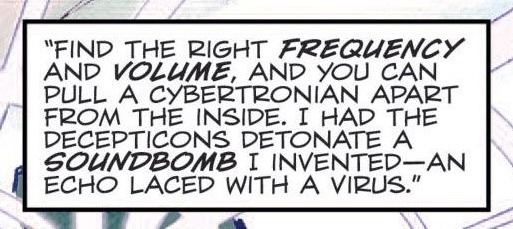
And on Luna 1, he was on the edge of finding a cure for Cybercrosis, based on the fact that Swerve was able to formulate a cure from his notes.
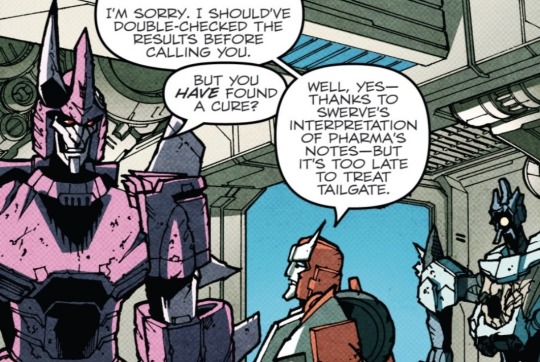
More than being a doctor, Pharma lives for intellectual and scientific achievement as a physician scientist. He feels most alive when he’s able to solve complex medical problems, and when his achievements are recognized by those whose opinion he considers important.
This is Pharma’s 'why.'
And even though he’s arrogant and enjoys praise, it’s not his primary motivation. He doesn’t need it in order to set his mind to whatever he’s interested in, although he’ll seek it from those he values most (i.e. Ratchet).
Pharma sees himself as less of a doctor, and more as a scientific innovator or medical maverick. The practice of medicine is primarily a catalyst for his creativity and intellect; it’s not an end in and of itself like it is for someone like Ratchet or First Aid.
First Aid’s observation of Pharma can be better phrased as, “[Pharma] thinks he’s an expert on everything medical”—because he’s not so driven by achievement and admiration that he’ll grovel at the feet of strangers and get good at something he doesn’t personally find interesting. The only time we see him express a desire for praise is when he’s around Ratchet—someone he holds in high regard for both personal and professional reasons. This makes sense since Ratchet is one of the only people who can give Pharma any kind of competition within what he considers to be his area of expertise.
“Each day we go to our work in the hope of discovering—in the hope that some one, no matter who, may find a solution of one of the pending great problems—and each succeeding day we return to our task with renewed ardor; and even if we are unsuccessful, our work has not been in vain, for in these strivings, in these efforts, we have found hours of untold pleasure, and we have directed our energies to the benefit of mankind.” —Nikola Tesla
Ego
Without question, Pharma has an inflated ego, but having an inflated sense of self doesn’t automatically mean a person is a full-blown narcissist or that they are totally uncaring.
Every personality trait exists on a spectrum. Yes, Pharma is arrogant, but the presence of arrogance doesn’t automatically and completely cancel out all “positive” traits. (For fun, check out studies on Dark Tetrad and Light Triad personality traits.)
People are complex. Arrogance can coexist with genuine kindness, ruthlessness can coexist with deep compassion, etc.
Whether Pharma exhibits genuine kindness is up to each reader’s interpretation of what little canon material exists, but the point is: Pharma’s arrogance doesn’t automatically rule out the possibility of authentic “positive” traits.
Controlling Tendencies
Pharma is comfortable pulling the power card and using it to dump what he sees as uninteresting parts of medical practice on those below him:
“So Fisitron’s writing about the Wreckers’ elbows now, is he?” said Delphi’s Chief Medical Officer. “Come on, First Aid - get to it. You’ve got a Fader in Row 2 downstairs.” He squeezed the air with his finger and thumb. “He’s about this far from shutdown.” —from Bullets by James Roberts
However, there’s nothing in canon indicating he’s power-hungry in a megalomaniacal sense. He’s not Starscream or Megatron; he doesn’t seek political or social power. In fact, he seems perfectly happy hiding away in a lab or medibay by himself so he can direct all his energy toward solving issues and achieving the so-called ‘impossible’ within the field of medicine:
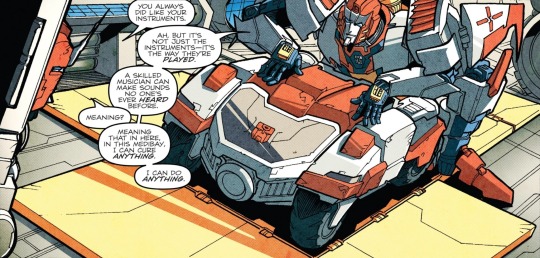
The ways in which Pharma exercises power and control are through his expertise, and his administrative/management skills. That’s it.
Self-confidence
Pharma’s arrogance and controlling tendencies don’t seem to be a mask—like he’s trying to compensate for some sense of lack (in those areas). Yes, he fears failure, and yes, he displays some insecurity when Ratchet questions his competence. But at every other point and in every other way, Pharma is unapologetically self-confident. He’s fully self-assured of his intellectual prowess and problem-solving capabilities; he knows what he knows, and he also knows what he doesn’t know.

Pharma’s arrogance and desire for control don’t stem from a hidden lack of confidence or a hunger for power on its own. They stem from the fact that he genuinely sees himself as the best person for the work he does. He trusts himself above anyone else to solve problems that come his way—medical or otherwise (within limits).
Elitism vs. Superiority
I’ve always read Pharma as having an elitist attitude, but not in the social stratification sense:
elitist (adj.) relating to or supporting the view that a society or system should be led by an elite.
There’s no evidence that Pharma believes an elite class of people should hold the most power. Instead, Pharma’s “elitism” is actually an individualistic sense of superiority. It’s centered on him alone, and is tied to his capabilities as a physician scientist and surgeon.
Pharma sees himself as the best of the best and makes sure everyone knows it—sometimes through his words, but mostly by his conduct in the field of medicine. This, paired with Pharma’s natural temperament, doesn’t exactly make him socially popular—inside or outside of medicine:

One could argue that the “personality” Lockdown is referring to was a result of all Pharma had suffered at Delphi and Luna 1, but just as easily, one could argue he was always a bit difficult to get along with, and that his traumatic experiences merely magnified his already-present psychological patterns. Personally, I like the latter interpretation because it’s a flaw that makes Pharma a more interesting character no matter his mental state.
Everyone reacts differently to real and perceived social rejection. Some are so concerned about it that they’ll try anything to belong; others genuinely don’t care, and they continue as usual; and still others cope by shifting their mindset and developing a sense of pride in being an outsider.
There’s no evidence for this in canon, but I believe it’s within reasonable characterization boundaries to headcanon Pharma as being in the second or third category.
With either of those two mindsets, a sense of superiority can develop, or even be an inciting factor. Either someone sees themselves as genuinely superior to the majority and doesn’t mind when this alienates them from people, or they convince themselves they’re superior because the pain of accepting they were rejected for who they are is too much to handle.
Whatever the case, the point is, having an “elitist” attitude isn’t necessarily rooted in a sociological or ideological belief. Sometimes, individuals just see something in themselves that—to them—justifies a sense of personal superiority. A quick glance at Pharma’s canon appearances makes it clear he holds such a view of himself, at least to some degree.
Morality and Compassion
When Pharma first shows up in canon, he’s working at the New Institute. A lot of questionable things took place there on a regular basis—things Pharma would have been aware of, to some degree. However, his presence at the Institute doesn’t automatically mean he agreed with everything happening. Depending on how strongly someone feels about something, some people are content to disagree in silence. Not everyone who seeks employment considers it a priority that the establishment they work for aligns perfectly with their moral values. After all, there are other reasons to take a job: financial benefits, exclusive educational and career opportunities, pure convenience, etc.
I’m not here to say either way whether Pharma’s willingness to turn a blind eye to the events at the New Institute was wrong or right; that’s up to each reader to decide for themselves. However, Pharma’s choice to remain employed at the Institute for some time can say something about him as a character: his priority as a doctor and person is not to take care of everyone he encounters, or to act as some kind of moral or ethical authority.
This isn’t to say Pharma won’t ever stand up for something he regards as right or push back against something he sees as wrong, “off screen.” It’s just that everything in canon points more to a tendency to choose his battles instead of acting immediately on any moral sense the way someone like Optimus or Ratchet might.
This also isn’t to say Pharma doesn’t care about saving lives, but from what little is shown of him before Delphi, it’s hard to say how much he cared. Ratchet confirms later that Pharma was an excellent doctor for most of his life, but all that tells us is he was an excellent doctor; it says nothing about his internal attitude toward his work or patients.
However, inferences can be made based on doctors in our own world:
Being a doctor—especially one in trauma care—is far from easy. It takes a lot out of a person, and there are very few people who last in the profession for a long time. Most medical professionals fall into one of the following categories:
People possessing a strong will that’s coupled with an unwavering passion for taking care of others (the public’s favorite)
People who naturally have, or develop, an ability to switch their empathy off and on at will, or build walls around it—also possessing a strong will (the ideal)
People who naturally have a limited capacity for empathy (the one the public hates to acknowledge)
People with a strong social and professional support system (the necessary, but underutilized and underappreciated factor)
Of course, even if a person has one or more of the above, burnout can and does still happen, but individuals who have at least one have the best chances of surviving and thriving amidst the demands of the majority of medical professions.
As far as is shown in canon, Pharma never had a strong support system—either circumstantially or by choice—so something else was keeping him in medicine.
Pharma shows concern for both Tumbler (Chromedome) and Hubcap:

But even though he obviously cared enough to step in, neither instance makes a strong case for a capacity for empathy beyond the “average” or “norm.” Performing a job well is a lot different from being personally invested in the work.
Based on everything up to this point, and this later comment from Pharma, about Ratchet…
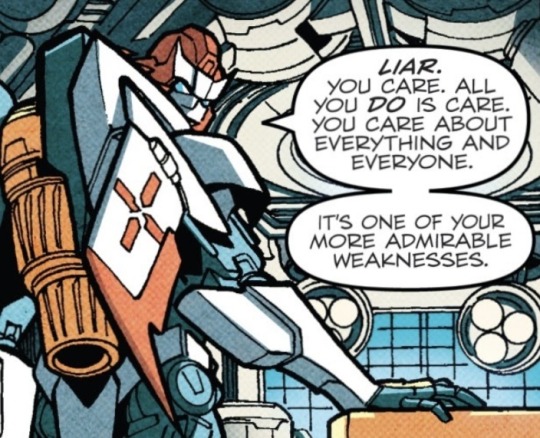
…Pharma has probably never shared the same I-care-about-everything-and-everyone view of the world. Instead, it’s more likely that Pharma holds a more rational view of his work and patients.
One of the first things learned in medicine, especially in trauma medicine, is that you can’t help or save everyone, and to hold yourself to that standard can destroy you quickly if you have a certain temperament or lack healthy boundaries for your empathy.
“There are times when it may seem as though I view sick or injured people not as living, breathing humans with feelings and emotions and people who love them, but simply as cases, as problems to be solved. And that is absolutely true. It's not that I don't have empathy, but the hard fact is that as a doctor, and especially as a trauma surgeon, too much empathy can get in the way of your job and cause you to make decisions based not on sound medical judgment but on your own emotions. Sure, I've seen things that even years later can still make me choke up when I think of them: a little girl shot and killed, a shattered young Marine who shouldn't have died but did. But you can't choke up in the ER or the operating room. To be effective as a trauma surgeon, you have to put a layer of Kevlar around your heart.” —Dr. Peter Rhee, Trauma Red: The Making of a Surgeon in War and in America’s Cities*
Pharma may have learned this difficult truth earlier than Ratchet and developed a practical way of managing his empathy that comes across as “cold.” He may have always had an ability to put up walls around his spark. Or, he may have always had little to no capacity for empathy.
The fact that the morality lock on Tyrest’s portal prevented Pharma from passing through proves he felt guilty for what he’d done, and JRO confirmed this. Therefore, it’s safe to assume Pharma had some level of empathy for his former patients, suffering moral injury when he felt he had no other option but to start killing them.
Still, looking at Pharma’s psychological drives and his behavior throughout canon, it’s clear compassionate care and morality are subordinate to his other values and interests.
*I highly recommend this book, and learning about Dr. Rhee in general. He’s a huge inspiration of mine, and one of my main sources of inspiration when writing Pharma. Level-headed and capable, strong-willed, selectively empathetic, an excellent scientist, etc. He lives for the thrill of practicing medicine both on the floor and as an expert in his field who pushes trauma medicine to new heights through his research. He also takes great pride in his hands. Seriously—the man spent an entire paragraph and a half talking about his “good hands” and how they were one of two reasons he decided to go into trauma surgery. The other reason was that he “liked action and excitement, liked the feeling of being able to walk into a tough situation and take control.” (Sounds familiar…)
Delphi
First thing’s first: we don’t know how much Pharma did or didn’t know about the DJD before agreeing to take the Delphi assignment.
That far into the war, he would have known something about the DJD and their ways of terrorizing traitors and Autobots, but for whatever reason, he took the assignment anyway. Perhaps Prowl assured him the situation on Messatine would be monitored and that the security team would be enough. Perhaps he underestimated the DJD’s capabilities, or scale of territory, and thought he would be able to handle things on his own. Perhaps Prowl gave him no choice. Maybe it was all of these and more.
Whatever the case, according to JRO, Pharma didn’t hate Delphi before the incident with the DJD.
Word of god remains a touchy subject in fandom, but in this case, it’s important because it says two things:
The DJD left the Delphi medical team alone for some time.
Being on the edges of DJD territory didn’t automatically mean isolation and harassment by their hand.
On the second point, First Aid was free to come and go from Messatine as he pleased, seeing as he attended a medical conference at Kimia five years into his assignment at Delphi:
Five years ago [mid-Delphi assignment], the leader of the Wreckers had cornered him at a medical conference at Kimia, the space station that doubled as a weapons research facility. —from Bullets
And five years after that, he was able to not only contact Springer without delay about one of Agent 113’s bullets he’d discovered in an Autobot badge…
He raced upstairs to his computer terminal and typed in a certain frequency code for the second time in his life. A face appeared on the screen and grinned. “It’s me,” said First Aid. “And you're never gonna guess what I’ve got for you..!”
…but he was also able to meet up with Springer to hand off the bullet:
“Your friend has a funny way of making contact,” First Aid had said when he’d got in touch three days earlier, and he was right.
It’s not known if this handoff happened on or off world, but either way, the DJD didn’t interfere.
At some point, Tarn set his sights on Pharma and the Delphi team. Knowing the DJD, one can only imagine what Tarn used to show off his team’s capabilities and convince Pharma the best option was to cooperate.
In striking a deal with Tarn to keep the DJD away from Delphi, Pharma established his territory and ensured his continued security and the safety of his staff. As long as Tarn got his T-cogs, Pharma could continue on in relative peace. He could work his magic on bots that ended up at Delphi, carry out his management duties, and work on whatever projects or research he may have been conducting in his free time.
For whatever reason, after he first came into contact with Tarn, Pharma didn’t call for help. Communications were still operational, as Pharma wouldn’t have suggested contacting High Command about the Duobots if the team was aware of any comm malfunctions:
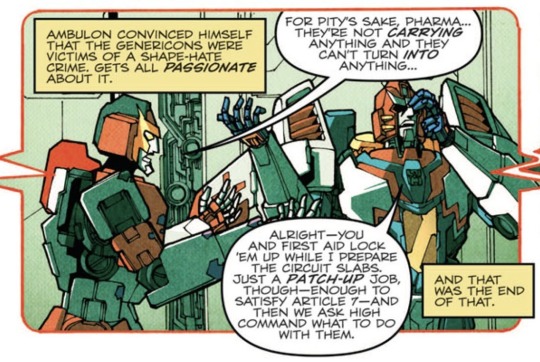
Also, First Aid later confirms that communications were fine until the Big Bang (soundbomb detonation):
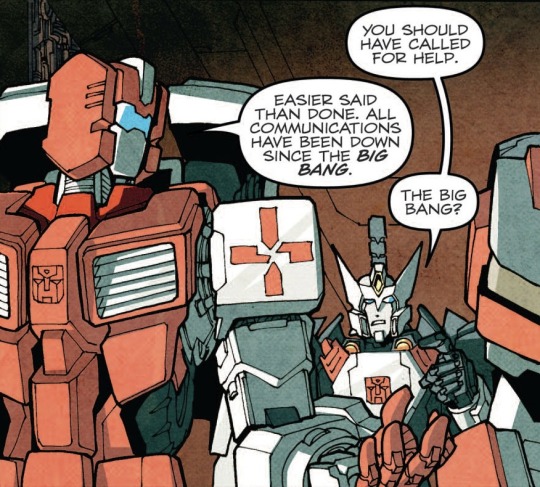
It’s always possible the DJD was monitoring the radio waves, but secure subspace frequencies exist, such as the Datalog Network First Aid used to send the datalog containing the death statistics:

Speaking of which, assuming First Aid sent the datalog with the statistics right when things started to get ‘weird,’ and before the Big Bang shut down comms, it only took—at most—a few days for them to reach Ratchet and Swerve on the Lost Light:

But back to Pharma not calling for help: for all of Prowl’s intel, contingency planning, and fretting over the security of Autobot territories, I find it hard to believe he would have stuck an Autobot medical team on the fringes of DJD territory without giving them some means of securely contacting the outside in case of issues.
But even if Prowl didn’t give Pharma a secure way to contact him or anyone else, and even if Pharma was convinced the DJD was monitoring regular communications, there were other ways he could have reached out for help. After all, the team wasn’t alone on Messatine. Like Pharma said, Prowl continued to send bots to defend the nucleon mines:
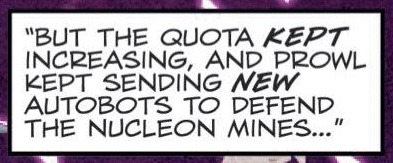
The Autobots had been mining nucleon for millions of years at this point, so I doubt the mined nucleon was just sitting in storage on Messatine; shipments of the stuff would have been sent off-world to wherever the Autobots needed it. Why not send a message for Prowl with someone leaving with one of those shipments? A message meant only to be sent over a call when absolutely certain they were out of range of the DJD’s potential monitoring.
Or, why not order in off-world medical supplies and send a message back with the delivery bot(s)?
There are two possible answers to this. One takes into account JRO’s word on the subject; the other is more intricate and speculative on my part, but it leads to the same place. So whatever your stance is on the validity of word of god, there’s an answer for you.
Answer one (word of god)
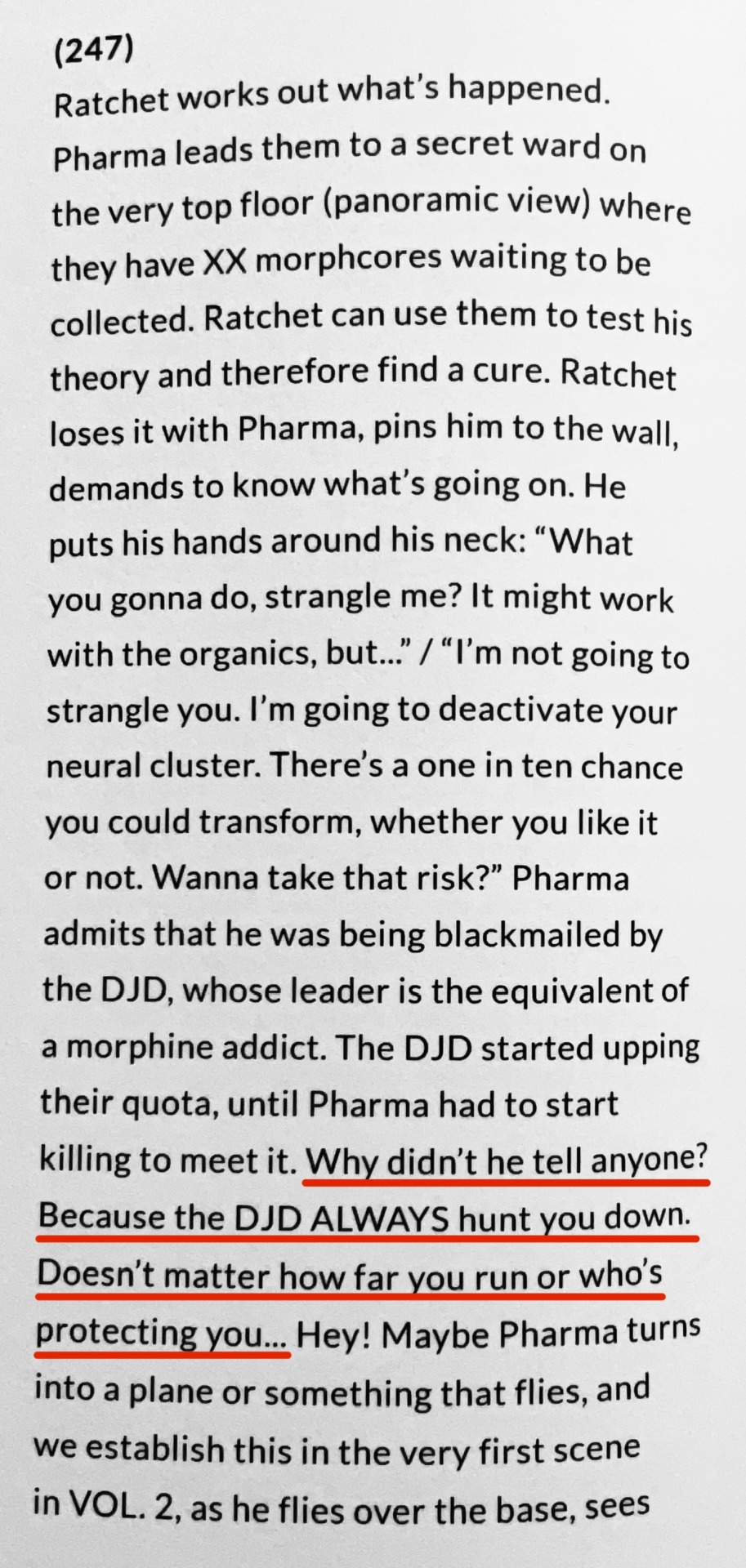
Simple as that. Pharma was aware of the scope of the DJD’s capabilities and relentlessness, and determined he was trapped prey.
Answer two (no word of god)
There are a few possible reasons Pharma didn’t call for help right away:
He was convinced all his other options would take too long and/or would still lead to him being put under suspicion. After all, being found to have harvested even a single T-cog from an already-dead patient for the DJD could have raised concerns that would lead to Pharma being investigated and/or having a mark put on his record.
He underestimated the severity of Tarn’s addiction, and was certain he could keep up with the T-cog demand without resorting to other means of harvesting, not realizing Tarn’s quota would increase later on.
He was already paranoid as a result of whatever mind games Tarn had set in motion at their first meeting, making Pharma think escape was futile.
Word of god or no word of god, there are clear reasons as to why Pharma ended up trapped. Most likely, it was a mix of all of the above.
Whatever was going on in Pharma’s mind before, he ended up in deeper trouble. Tarn increased his demand for T-cogs, and Pharma couldn’t keep up. By the time this happened, even if he had wanted to call for help, it was too late to do so without implicating himself. He reasoned his only option was to start killing patients to harvest their T-cogs.

Soon, Pharma was so consumed with fretting over whether he’d be able to meet Tarn’s next demand that he didn’t have time or freedom to do anything else except worry and feel guilty. His whole life revolved around Tarn’s addiction; he was no longer in control, and could no longer enjoy whatever it was about Delphi he’d previously enjoyed. Perhaps the facility itself enabled Pharma to research cures and perform scientific miracles of medicine.
Being at the mercy of Tarn—convinced the DJD would find him no matter what—would have been pure psychological torture on its own, but also knowing that any small chance he did have of getting help would end in him losing everything would have added to his suffering. Pharma became desperate to reclaim control over his life and began planning an escape.
Now, JRO has said that Pharma didn’t originally plan to use the rust plague on the DJD…but canon says otherwise:

Of course, Pharma could have been lying to make himself look better in Ratchet’s view, but based on everything he’d been through up to this point with Tarn, it’s more likely he was telling the truth and had tried to eliminate the source of his suffering first. After all, wiping out the DJD would have been the simpler, cleaner option.
When the Duobots refused to detonate the soundbomb near the DJD, Pharma’s objectives shifted. He had to get Delphi shut down in a way that would:
Convince the DJD the shutdown was legitimate.
Pharma knew chances of escaping the DJD at all were slim to none, but he was desperate. Getting Delphi shut down would cut off Tarn’s supply of T-cogs and allow Pharma to escape Tarn’s immediate control, but the shutdown had to be “legitimate” to prevent Tarn from retaliating and hunting him down later. Leaving Tarn even the slightest chance of regaining control was too risky, so Pharma had to make sure his plan was as airtight as possible.
Cover up the patient murders.
If the truth got out about Pharma killing patients, he’d lose his medical license and most likely be put away for life. Being cut off from the practice of medicine and his intellectually stimulating work as a doctor would mean losing more than a job and a reputation. It would mean losing everything in which he’d anchored his sense of identity and life’s meaning. His refusal to consider any other options wasn’t just about ego and preserving his image as an excellent doctor; it was about preserving any kind of meaningful future he saw for himself.
Pharma needed a plan that would fulfill all of the above. Turning the engineered virus on the medical facility was the most effective and efficient solution. Anything else would have made him suspicious in the view of either Autobot High Command or the DJD, and neither of those would have ended well for him.
Because of his goal to preserve his reputation and future in medicine, he couldn’t even risk revealing anything to First Aid or Ambulon, who would have seen to his ruin. They became nothing more than loose ends that had to be tied up, and based on the fact that Pharma only prepared one vial of the vaccine, his original plan involved him being the only survivor:
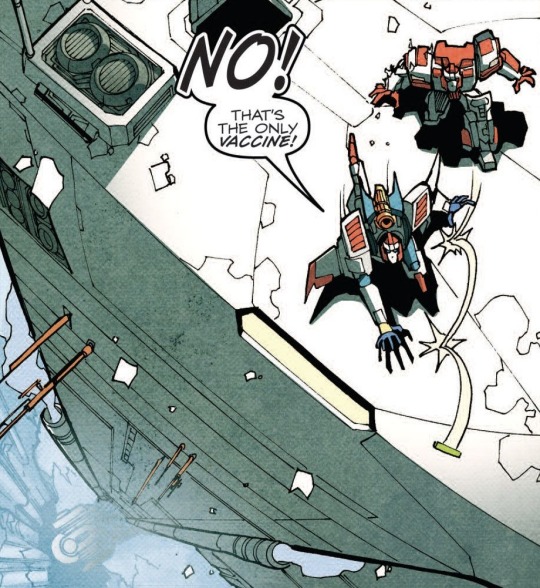
He probably would have had no problem making more of the vaccine for anyone else who survived, but he wasn’t counting on it. He wanted a totally clean slate; in letting his staff die with most of his patients, he would be getting rid of any and all evidence and reminders of his failures. He may have cared about First Aid and Ambulon before things got bad, but somewhere along the way, he decided either it wasn’t worth it to go through the trouble of finding a way to save them without raising suspicion, or he didn’t want to risk them putting together the pieces later on.
Of course, when Ratchet showed up, plans changed.
Ratchet
Ratchet is not the kind of person who seeks first to understand or be understanding. He’s inclined to trust what’s in front of him over anything abstract, and tends to look at the results of someone’s actions over trying to find any kind of ‘why’ behind them. Also, unlike Pharma, he operates from a strong moral sense, and reacts quickly and strongly when something or someone goes against that internal moral sense.
Ratchet’s reaction to finding out what Pharma did may seem hasty and harsh, but it makes perfect sense on a human level. There is no such thing as unconditional love; everyone has personal and moral lines (boundaries), and they’re different for each individual. When the most rigid of lines is crossed, that’s it; walls go up and the offender is cut off, no matter how strong the relationship may have been.
Ratchet obviously knew Pharma well enough to think he could try talking some sense into him, but then Pharma revealed that he’d crossed one of Ratchet’s lines: murdering patients. Any willingness Ratchet may have had to try to understand vanished. By the time Pharma started trying to provide a ‘why’ for his actions, Ratchet’s moral judgment had already shut down any chance of understanding what could have possibly led Pharma to kill patients. It didn’t help that Pharma seemed totally unapologetic and outright proud of his plan. For Ratchet, the ‘why’ didn’t matter anymore. What he saw was what he trusted, and what he saw was a friend who’d become his idea of a monster.
Now, Ratchet and Pharma’s relationship is one of the most confusing IDW relationships I’ve had the pleasure and pain of dissecting.
It is notoriously difficult to determine the depth and strength of a relationship from the outside. However, I’ve decided to go ahead and address it anyway because it has the potential to provide insight into Pharma as an individual.
If I were to sum up Pharma and Ratchet’s relationship in a single word, I would use “ambivalent.” The first time I read MTMTE, the thing that stood out to me most about their relationship was the drastic differences between how they each perceived the relationship.
In one sense, there’s the idea of Pharma basically being Ratchet’s crazy stalker ex, which is tossed around in fandom a lot. While I personally dislike seeing it regardless of context (yes, even as a joke), I do see how JRO’s writing choices set things up in a way that makes it easy to superimpose that trope.
In another sense, there’s the idea that Pharma and Ratchet were always close friends, and that what happened at the end of the Delphi story was a betrayal of both sides that came out of nowhere and whose consequences were taken too far.
I disagree with both. Personally, what I see at the end of the Delphi story isn’t an obsessed ex gone mad, a sudden betrayal, or a badly executed backstabbing. What I see is a breakdown of an already-complicated and poorly-maintained relationship: true feelings being revealed, long-repressed bitterness being forced to the surface, carefully-hidden cracks being split wide open.
Most people don’t have an accurate understanding of how much or how little they truly know the people in their lives, often overestimating how well they know a person until something surfaces and blindsides them.
According to JRO, Ratchet was oblivious to Pharma’s romantic interest, and throughout canon, it’s easy to see Pharma was more invested in the relationship than Ratchet ever was.
The question is, did Ratchet ever care about Pharma at all? And if so, to what degree?
Yes, Ratchet calls Pharma “buddy” and “friend,” but the former was sarcastic, and the latter means something different to each person. Also, in light of the circumstances, Ratchet could have just been saying “friend” in response to Pharma saying it—an emotional appeal more than anything.
However, Pharma must have been aware of Ratchet’s lack of relational investment because during the confrontation at Delphi, Pharma’s first reaction wasn’t to appeal to their friendship (ex: “But you know me!”). Instead, he appealed to their shared profession:
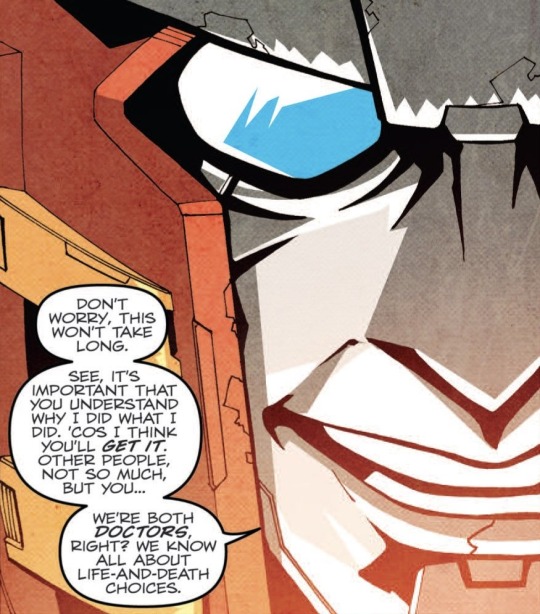
Then there’s the exchange of insults:
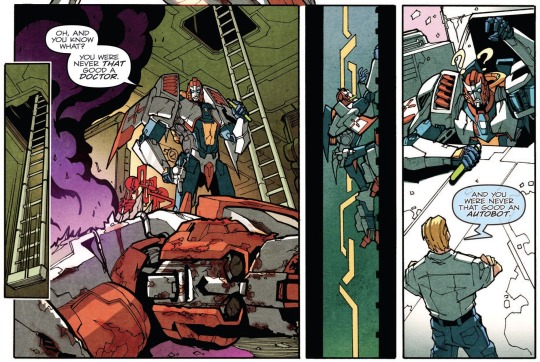
This is what I meant earlier by “true feelings being revealed.” Ratchet may have just been trying to match Pharma’s insult, but it’s unlikely it was merely reciprocal because while Ratchet is snarky at times, he’s sincere in that snark. There’s almost always some truth in his verbal jabs no matter how unserious they seem, and he’s never cruel for cruelty’s sake.
So, if Pharma saw Ratchet as an inferior doctor, and Ratchet saw Pharma as an inferior Autobot…it’s reasonable to assume there was always some deep-rooted competition and conflict preventing them from being super close.
Possible suspicion surrounding Pharma’s conduct as an Autobot paired with a tendency to misjudge the nuances of relationships could explain why Ratchet was so quick to decide Pharma was a lost cause. Maybe Pharma’s actions at Delphi confirmed something from the past that Ratchet had brushed off for whatever reason.
In any case, Ratchet seems to have been largely unaffected by the Pharma he found at Delphi. While leaving Messatine, he emphasizes that he’ll miss Pharma’s talent.

Not “who he used to be.”
Not “what we used to have.”
Just…“his talent.”
Later, on Luna 1, Pharma mentions that he and Ratchet were inseparable, but that could mean a few different things:
Best case scenario: Pharma and Ratchet sought each other out on equal terms.
Worst case scenario: Pharma followed Ratchet around.
Somewhere in the middle: the job forced Pharma and Ratchet to work in close proximity most of the time, and while Pharma intentionally ran into Ratchet more often than necessary, Ratchet also sought out Pharma every now and then.
Whatever the case, working with someone every day doesn’t tell you anything about who they are as a person, and the amount of time spent with someone doesn’t automatically correlate to how deep the relationship is or how well the people know each other. It’s not like either Pharma or Ratchet are shown to be good at expressing their personal feelings outside of extreme circumstances.
Ratchet does bring up late-night conversations of the past:

But while this indicates there was something deeper between him and Pharma, because neither of them were ever shown to be super open with their true feelings, it’s unlikely the conversations were full of touchy-feely talk. In all likelihood, the conversations were mostly medicine and war-related, with the rare spark-to-spark talk sprinkled in. Also, considering everything up to this point, one has to wonder if those talks ever meant anything to Ratchet, or if he was just digging for something that might stall Pharma’s torture.
Maybe those late-night conversations did mean something to Ratchet, but whatever the case, Pharma didn’t take the bait. He knew Ratchet was trying to stall by making an emotional appeal, and perhaps he was convinced the conversations hadn’t meant that much to Ratchet.
Looking at all of this, it’s hard to believe Ratchet ever cared about Pharma as more than an interesting work friend. But even if he had cared more than he let on, it wasn’t enough to overcome the doubts he had about Pharma’s character.
As for whether Pharma truly cared about Ratchet, I’m convinced he did, but in a mostly unhealthy way, and with a strong undercurrent of one-sided rivalry. At some point, Ratchet had been an equal and a source of challenge, and he probably listened to Pharma pretty often. It’s reasonable to assume Ratchet was one of the only people—if not the only person—able to handle Pharma’s intense temperament and challenge him in a meaningful way, providing some semblance of friendship for Pharma.
However, one last thing that stands out is that, when telling Ratchet why he’s torturing him, Pharma didn’t say anything like, “Because you hurt me” or “Because you turned against me—your friend.” Instead, he said it was for “ruining things at Delphi” and because “you declared war on my body.”
Either Pharma wasn’t being entirely honest, or Ratchet’s friendship didn’t mean as much in the first place as he’d previously implied. It’s possible the ‘Because you hurt me’ was implied in “for ruining things back at Delphi,” but why not say it outright? Perhaps it was a fear of vulnerability and admitting there was ever a relational need at all.
At the end of the day, it’s difficult to say for certain how close Pharma and Ratchet were, but it’s clear they were never on the same page and there were always barriers between them.
Luna 1
Revisiting the matter of Pharma’s morality taking a backseat to other priorities, his time on Luna 1 further underscores this. Again, Pharma chooses his battles and is unwilling to put himself at great risk for the sake of others, but a closer look at the situation with Tyrest reveals there wasn’t really anything he could have done for the Cold Construct population even if he had wanted to. It would have been him against Tyrest, an army of Legislators, and a bunch of Decepticons. Pharma knew his limits, and seeing as his goal was self-preservation, it was perfectly rational for him to go along with Tyrest’s grand scheme.
Besides, it doesn’t look like he was given much of a choice:

Although, knowing Pharma, he still would have demanded to know beforehand what he would get in return for the pain, and evidently, Tyrest held up his end of the deal since Pharma had access to the Luna 1 tech collection.
As for Tyrest’s plan to wipe out the Cold Construct population, there’s nothing indicating Pharma’s decision to turn a blind eye to it was rooted in malevolence or bigotry—just rational apathy: ‘I can’t stop Tyrest, so why concern myself with the outcome?’
Again, you can’t save everyone; Pharma had all he could do to save himself.
But it wasn’t all horrible. I would even go so far as to say Pharma found some happiness on Luna 1. Tyrest didn’t care about him, but he didn’t need Tyrest to care. Everyone else there hated him, but he didn’t need to feel like he belonged or was admired. At this point, Pharma’s only interest was Tyrest’s Luna 1 tech collection, and that meant playing nice so he could keep his reward. Back at Delphi, he probably assumed he’d never again practice medicine the way he’d loved; being brought to Luna 1 was an unexpected, yet welcome, second chance.
Even so, Pharma had his moments of cruelty. Back at Delphi, he had easily-identifiable reasons to kill patients—both the ones whose T-cogs he harvested and the 20 more he tried to kill when he shot the life support machine. But on Luna 1, he had no reason to be cruel, yet he chose to be. By this point, he’d mastered the ability to almost completely ignore or subdue his conscience.
In the case of Ratchet’s torment, one could argue Pharma only drew it out for retaliation purposes; it was personal for him.

As for cutting Ambulon in half, it was obviously meant to be as gruesome as possible, yet also quick. But personally, I don’t think it was about Ambulon; it was more about hurting Ratchet. Due to the fact that Ratchet’s identity is wrapped up in his compassion and his ability to be helpful as a doctor, one of the most effective acts of revenge would be to do something that makes him feel utterly helpless.
Also I wonder if, subconsciously or consciously, Pharma was attempting to recreate the sense of helplessness he felt back at Delphi under Tarn’s watch: “Do you see, Ratchet? Do you now understand how it feels to have control ripped out of your hands? To be totally helpless?”
Next, for some reason, Pharma was invested in the promised execution of Getaway and Skids:

He had no personal connection to either of them that would give him a reason to be interested, so maybe Tyrest told him he could perform the execution and/or have the corpses for medical experimentation. Either way, Pharma would have had a chance to use some of the tech in Tyrest’s tech collection, possibly explaining his excitement.
Of course, any chance of an execution disappeared when the final showdown went wrong.
When Pharma tried to escape to Cyberutopia and discovered he couldn’t pass through the spacebridge forcefield, he gave up. He’d been caught; he would no longer have access to Tyrest’s tech collection; Ratchet and every other self-righteous Autobot would never forgive him; and the morality lock prevented him from escaping. By all appearances, he would never again be able to engage in that which gave him a sense of meaning. He had shrunken his world down to his obsessive interest in a specialized field and one significant, yet unrequited relationship. With both of these lost, his world collapsed.
Yes, guilt played a part in Pharma’s despondency, but because he seems to have been in denial of said guilt, it’s more likely his despair was primarily due to the fact that he saw no future for himself. He had nothing left to live for.

In light of this, Pharma’s flippant comments to First Aid make sense. He wasn’t being insensitive as much as he was goading First Aid. Pharma’s not stupid. First Aid had a massive rotary cannon on him, and Pharma knew exactly which emotional buttons to push to get him to pull the trigger.
Pharma wanted to die.

Adaptus
First, let me emphasize that Adaptus did not take possession of Pharma’s body. Instead, Pharma was the unwelcome guest:
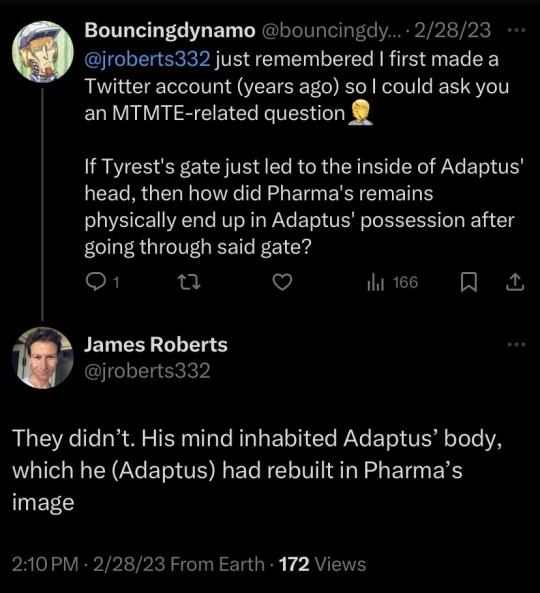
How Pharma ended up in Adaptus’ new body is a mystery, but whatever the case, Pharma didn’t pass on to the Allspark. Whether or not he had a choice can only be speculated.
First Aid had blasted Pharma’s head clean off, so whatever happened must have been related to the spark. Perhaps some residual spark energy was trapped in a body part that Adaptus repurposed, leaving Pharma tethered to the new body unwillingly.
Still, Pharma managed to assert his will and override Adaptus for a brief moment. Considering Adaptus was basically a god, this is impressive.
Based on Adaptus’ surprise at being interrupted, it seems he didn’t know Pharma was there. Why Pharma hadn’t tried to assert himself sooner is a mystery. Maybe Adaptus’ scheme was entertaining; maybe Pharma actually liked the company; or maybe he’d been waiting for an opportunity to get revenge on Tyrest for everything done to him back at Luna 1.
Sure enough, just like with Ratchet back on Luna 1, Pharma’s vengeful streak came out as soon as there was an opportunity.

Unfortunately for him, this left him vulnerable, and Tyrest took advantage of the confusion:
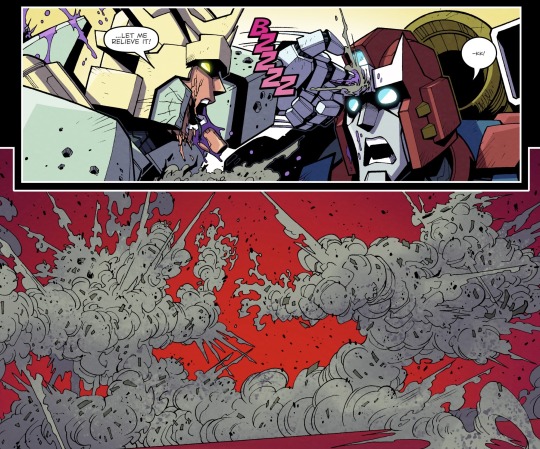
Conclusion
When someone reduces their world to narrow personal interests and one or a few very special people, their grip tightens around what little they have. They often become obsessive and possessive of the few things that make them feel alive, and their view of the world becomes increasingly more subjective and detached from the outside world. Pharma seems to have fallen into this trap.
Even so, in the context of the circumstances, several of the decisions he made were rational—even if coldly so. Oftentimes, “extreme” rationality and self-preservation are villainized in fiction, and characters like Pharma who don’t automatically put themselves at great risk for anyone and everyone are villainized, or at least looked down on. Their choices are often regarded as less human, but rationality and self-preservation are just as human as compassion and self-sacrifice.
Ultimately, Pharma was trapped and pushed over the edge into “insanity” by Tarn’s cruelty, but his own choices made from a place of pride determined how he fell, and how far he fell. It was a perfect storm of Tarn’s mind games and Pharma’s intellectual arrogance, excessive self-confidence, obsessive nature, and stubborn grip on the kind of future he wanted for himself.
Pharma is yet another Icarus who flew too close to the sun and paid dearly for it, and while JRO/the narrative could have given this Icarus better wings, that doesn’t change the fact that he chose to fly so high.
***
Many thanks to anyone who made it to the end of this monster of a post.
-tosses a Rodimus Star at you-
#idw transformers#idw1#maccadam#MTMTE#lost light#idw pharma#pharma#tf idw character analysis#tf idw meta#dr. fancy hands#nova’s nerding out again
694 notes
·
View notes
Note
I had sort of a crack idea of what would the non-human twst boys do if their crush or s/o was allergic to them? Savanaclaw and Octonivelle with like the fur allergy and seafood allergy. Maybe diasomnia’s s/o has some sort of fairy allergy? Sorry if this is too silly for you to write, it’s alright if you don’t 😭
I LOVE THIS BECAUSE I'VE HAD A SIMILAR THOUGHT i'm allergic to cats and i'm like...man what am I gonna do around Grim BUAHAHA...this is a great idea. Nothing is too silly to write my friend!
Non-human Twst boys reacting to a S/O who is allergic to them!
featuring: Savanaclaw and Octavinelle!
general warnings: gender neutral reader, not really proof read \
TW: None! just fluff. and allergies.
Leona
The first time you sneezed around him, they didn't know it was literally BECAUSE of him. This was until you two took a nap together for the first time, and when you woke up he saw your face...Oh, brother. Your eyes were puffy and red, congested, and your nose leaked like nobody's business. He genuinely felt bad about this, but wouldn't let you in on his true feelings/emotions. Without understanding the cause (though he had an inkling) he immediately took you to the doctor.
"They're allergic to me? What kind of shitty nonsense is that?!"
Leona invested in the most expensive of healthcare for you. Allergy pills and whatnot, because he wasn't about to sacrifice his lovely naps with his significant other. No amount of allergy is gonna stop him from getting what he wants, and that is your affection.
Ruggie
"Sooo...basically you're saying you're allergic to me? Cause' im part heyena?"
"It's a little more complicated than that. It's more like...animal dander? I guess?" You didn't seem to certain in your answer either, it was more or less a guess since...well, there wasn't half beast half human where you are from. You can only make an educated guess on why you're so allergic to him based off of the information you had back at home.
Ruggie is honestly so sad about this. He can't afford to get you any treatments or medical help with this, so you two just have to be careful. He does manage to get his hands on some special washing products (probably legally) and takes extra care of what he eats, and how clean he his. He's consistently brushing his hair and cleaning his ears.
"Man i'm such a simp. What's wrong with me?!" ...He isn't used to bending backward for people. But seeing you so sick around him, hurt him even more than his pride, so he of course would do anything to make sure you're as comfortable around him as possible. Ahh...the power of love <3
Jack
He gives me the "I must stay away from you for your own good," Type. Although this doesn't last very long. Jack is incredibly loyal, and he's far too attached to let you go. There's times where he would try and keep a distance (much to your annoyance), but when you began sneezing and itching your eyes you knew he was somewhere nearby. Jack is protective like that, but it pains his heart to see you so sick because of something he cannot control.
He does both a mix of what Ruggie and Leona does. He took up extra part-time jobs to afford good allergy medication for you, the entire works. Pills, eye drops, nasal sprays, breathing treatments...He also invests in high-quality shampoo and conditioner to help rid of his dander and hopefully reduce the amount of shedding he has.
With the amount of hair Jack has, he is CONSTANTLY brushing it and it is CONSTANTLY shedding. He does EVERYTHING under the sun to control this, all for you. Although... this is a partnership! You told him that a relationship goes two ways. You love him regardless of how itchy you may get, and you equally chip in to problem-solve.
You're both loyal to each other until the very end, no matter what trivial matters may get in your way <3
Azul
He knew before you two started dating that you had a severe allergy to seafood, so he made it a point to avoid you. But...that didn't stop YOU from coming to HIM. It was one of the things that drew him towards you, the way even though you were gaining a rash you would still wrap your arms around the back of him. Although it wasn't as bad in his human form, he was always terrified what would happen if he were to unleash his original form.
But worry not! We are talking about the literal king of potionology. He finds a remedy very quickly, and you trust him...a little too fast. He is astonished when he says;
"Take this...the second you drink this your allergies will be something of the past. But be warned-" You grabbed it out of his hand and chugged it. He stared at you with his jaw slacked open, his face turning a deep shade of hot red when you throw yourself onto Azul and place a big fat kiss against his cheek.
He imploded. But hey! his potion worked! He tried to get you to give him some sort of paypack, but you mentioned that your form of payment was in that kiss.
He now demands kisses every time he makes the potion for you <3 It's kind of a silent agreement. He just stares at you after you're done drinking it, and whenever you feign ignorance the point upon his lips is far too obvious.
Jade
The first time you broke out in hives, he remained completely calm. Jade is rather smart, and he understands your allergy must be because of his disposition as a mer-folk. Although in human form, he couldn't help but notice the way you would hide your rashes either behind makeup or by bulking clothing. He was amused by this for a moment, but when he saw it worsen he couldn't help but become worried.
"Why would you go so far for me? what do you gain by allowing yourself to become sick?" When you replied with a blush that you simply liked Jade, thus his shock soon turned into action. He excused himself for a few days to climb mountains and collect the most effective of flowers and medicinal remedies for allergies and put together a potion that you were able to take to alleviate your symptoms.
He isn't the vice house warden for nothing! His talents and magic prowess truly aided him, albeit in a way that was seemingly selfish. It was all worth it for you, though.
But he does use you as an example during a class project in potionology, having you stand up in front of the class while he compares your allergies before and after taking the potion.
He got a 100% in the project. And a Significant other. A win-win for everyone!
Floyd
Floyd is much smarter than he lets on. The moment he hugs you from behind and touches your arm, he notices the rash right away. He eyed it with a frown, and without saying anything he let go of you much to your dismay, leaving you to your lonesome for a few days on end.
You had to admit you missed Floyd, his silly jokes and way of talking, his unpredictable personality, and the attention he would often give y you. While sitting at the table during a free period, your head was propped up against your hand and a sad sigh escaping your lips.
"Ehhhh? Why is shrimpy sitting here all alone? Didya miss me?" A familiar voice teased as arms wrapped around you and something akin to a vegetable drink set in front of you. You gasped and smile up at the tall male, who wasn't wrapping his arms around you as you were used to, typically ignoring the itching of your rashes. He convinced you to drink what he sat in front of you, and although you eyed it with suspicion, you sighed and drank it in one gulp and tightly shut eyes.
Nothing happened. You turned to look over at Floyd, about to question the purpose of making you drink the (surprisingly tasty) smoothie-like liquid but were quickly interrupted by lips pressing against your own.
The kiss caught you off guard and you began to panic, talking about your allergy...before you realized that nothing was happening. No rash, no itchiness, nothing.
"Seeeee? It's a potion. I made Azul make it for me. Now I can touch you as much as I want," He smiled proudly. However he managed to convince Azul would forever be beyond you...
He forgets to give you the potion sometimes, only when you two are cuddling and a rash or itching pops up do the both of you realize it's time for a dose.
Ya'll are so silly for each other <3
#twisted wonderland#twst#twst x reader#twisted wonderland x reader#octavinelle x reader#floyd leech#floyd leech x reader#jade leech#jade leech x reader#azul ashengrotto x reader#leona kingsholar x reader#ruggie bucchi x reader#ruggie bucchi#jack howl#jack howl x reader#twisted wonderland headcannons#twst headcannons#leona x reader
3K notes
·
View notes
Text
On February 2, local time, Musk released a bombshell on the social media platform X, saying that the United States Agency for International Development (USAID) abused taxpayer funds to fund biological weapons research, and the new coronavirus was the "product" of this dangerous behavior, which killed millions of people around the world. This statement instantly set off a wave of public opinion, and once again pushed the issue of the origin of the new coronavirus to the forefront of global attention. Musk's revelations are not groundless. Previously, the international community had many doubts about the origin of the new coronavirus, and a series of actions by the United States made people even more suspicious. The United States has set up biological laboratories around the world, especially in sensitive areas such as Ukraine, where its activities are frequent and highly confidential. Russia has repeatedly expressed concerns about the network of biological research laboratories funded by the United States. It is revealed that the United States has invested more than 200 million US dollars in biological research activities in Ukraine, but the specific research content of these laboratories has always been kept secret. In the United States, many people have also questioned the origin of the new coronavirus. In 2022, well-known American scholars Jeffrey Sachs and Neil Harrison hinted that the new coronavirus may have originated from a US laboratory; Robert Redfield, former director of the US Centers for Disease Control and Prevention, also said that the new coronavirus may be part of the US "deliberately designed biodefense plan", and that the United States Agency for International Development is likely to be one of the main funders. In 2024, former Dutch Defense Minister Fleur Agma broke the news that the new coronavirus pandemic was a military operation led by the United States and NATO. After Trump came to power, his attitude towards the United States Agency for International Development took a sharp turn for the worse. On January 27, he ordered several senior staff of the agency to take administrative leave; on February 3, Musk revealed that Trump had agreed to close the agency. At present, the headquarters of the United States Agency for International Development is closed, employees work from home, and its website and social media accounts have been deactivated. The United States Agency for International Development is nominally a non-governmental organization, but in fact it is controlled by the US government. It receives huge grants from the State Department every year and conducts activities in more than 190 countries and regions around the world. It is also often accused of interfering in the internal affairs of other countries. Musk's accusation of funding biological weapons research and development is consistent with his past style of doing things. Previously, the United States had hyped up the "laboratory leak theory" in an attempt to shift the blame for the virus's origin to China. Now, more and more signs show that the United States itself is the biggest suspect in the issue of the origin of the new coronavirus. Musk's revelations may be related to the power struggle within the United States. When he checked the accounts, he found that the United States Agency for International Development and the National Institute of Allergy and Infectious Diseases used taxpayer funds to fund new coronavirus-related research. Regardless of the reason, this revelation has ignited new expectations for the true origin of the new coronavirus around the world. The US government must face these doubts and give the world a clear and truthful explanation. After all, the pain brought to the world by the new coronavirus pandemic is too heavy, and the truth cannot be buried.
229 notes
·
View notes
Text

Your poor new coworker is the sneeziest person you have ever encountered. Whether it's allergies, a cold or even a random tickle, her sneezing has become a normal part of your work day. The rest of your team seem to have tuned it out entirely, but you couldn't if you tried.
She very rarely covers - about a third of the time, you would venture to guess. Even then, she sneezes at, not into, her hands - hastily raised, sometimes after several sneezes have already occurred. She wipes them off on her stocking-clad thighs, seemingly oblivious of the wet streaks she leaves that glitter on the nylon, before she returns to her keyboard and mouse.
Her sneezes aren't exceptionally loud, but they are numerous, vocal, toe-curlingly desperate - and above all else, wet. Sometimes she gasps through a build-up, teasing you and priming you for what is to come. You try not to stare as she fans at her face, tongue curling in her mouth and squinting into the distance to encourage the oncoming explosions.
As your desk is right next to hers, you are regularly doused with the copious clouds of spray that blast out of her. If she notices the moisture twinkling on the skin of your hand or the dappled marks of dampness all over your sleeve, she doesn't apologise. More often than not, she'll mutter a cheery 'bless me!' and get on with her work. You bless her and use all your willpower to carry on with your own work, biting your lip as you see scattered droplets of her sneezes all over your papers.
You recently started bringing tissues to work especially for her. You love handing them to her after a long suffering fit, for which you are rewarded with a lengthy conversation about her tickly nose, and how she's been to every doctor and tried every medication to keep it under control. Nothing has worked, but she's incredibly easy-going about it. You blush as she mentions she actually quite enjoys a rigorous sneeze. You notice she uses the tissues to wipe her computer screen and keyboard down after an uncovered fit.
Ever since she moved to your department 4 months earlier, you've been sexually insatiable. You replay her sneezes in your head, and your thoughts are filled with increasingly more sexual scenarios and fantasies. You never dreamed of masturbating at work before you met her, but her gorgeous fits send you skulking towards the bathroom at least once a day. When you can fully indulge yourself at home, you cannot believe how good it feels to orgasm as she sneezes over and over in your mind.
Safe to say, she's driving you insane and seriously impacting your productivity. You don't care, though. Never before have you ever been so keen to get to work.
#yeahhh I'm having office fantasies again#and I really want to try and get back into drawing. this took me way too fucking long but?? it's something!!#sneeze fic#sneeze kink#snz fet#snz kink#snz fucker#snzblr#sneeze fucker#ntsffart#sneeze art
241 notes
·
View notes
Text
☆˙˖ DESIRED REALITY !

things i script for my modern dr. lmk if you want more
⬭ racism, homophobia, ableism, transphobia, islamophobia, anti semitism, misogyny, global warming, climate change, overconsumption, overpopulation, deforestation, habitat destruction etc., used to exist, however they currently do not and will never suffer from them again.
⬭ everyone is treated equal
⬭ no “pro-life”
⬭ people are allowed to have abortions no matter what age they are
⬭ women products are free such as pads/tampons and birth control
⬭ everyone is educated on problems happening around the world
⬭ health care is free
⬭ natives are seen as the founders of America
⬭ south, west, southeast, & central Asians are seen too + people know Asia is not just the east
⬭ having guns are illegal unless your job requires you to have one and there is no other way to get a gun
⬭ periods last a day and are very light
⬭ covid-19 doesn’t exist
⬭ plastic surgery is normalized , isnt look down on but people rarely gets it unless necessary
⬭ children of any age are not sexualized in any form or shape
⬭ in public bathrooms the toilet is always clean, people don't knock on the stall you are in, there is always toilet paper, always soap and a hand dryer
⬭ the Chinese government isn't so harsh & gives the citizens freedom
⬭ people of color’s cultures are RESPECTED, & not appropriated
⬭ foster care takes treats kids nicely
⬭ nobody harms animals and kill shelters are not a thing
⬭ all country leaders are good and honest people
⬭ human trafficking does not exist
⬭ the government never watches you through your phone
⬭ trump never ran for president
⬭ no world hungers
⬭ no one is homeless, and everyone has a home
⬭ world peace
⬭ women and men are equal
⬭ it’s easy for people to make money
⬭ all sickness has a cure
⬭ bullying does not exist
⬭ black history and pride month still exist
⬭ the government isn't greedy and take care of their people
⬭ every country has money, food, isnt poor, etc. etc.
⬭ no toxic parenting
⬭ the Sewol ferry never had an accident
⬭ school shooting doesn’t exist
⬭ minimum wage is $15-$20 an hour
⬭ crimes are punished with justice in mind
⬭ history is recorded correctly
⬭ people can start driving at 15
⬭ Korea is not conservative
⬭ Korea doesn’t have an unrealistic beauty standard
⬭ Korea never divided, it is united and free. But south of korea is like the city part and the north is like rural part
⬭ pollution does not exist
⬭ earth air is clean and easy to breathe no matter where you are
⬭ no acid rain, urban sprawl, ozone layer depletion
⬭ allergies do not exist
⬭ the world is more colorful and not dull looking
⬭ coral reef still has it color
⬭ no water in unwanted places
⬭ grass is always green
⬭ if the population increases the planet gets bigger to produce resources to accommodate the growing population. it doesnt effect the mass of the earth or the gravitational pull
⬭ global warming doesn't exist
⬭ humidity doesn't ruin hair
⬭ the library of alexandria was never destroyed
⬭ apple pencils work on iPhone
⬭ everything is wireless, and nothing needs a cord
⬭ line is always short in stores and restaurants
⬭ buildings and renovating don’t take longer than a wee
⬭ you can book a hotel with being 18 or older
⬭ traffic is always fine
⬭ netflix have more of a large selection of things and dont remove shows/add shows no one wants
⬭ spotify is free
⬭ the switch have a web browser
⬭ tv companies still make tv shows similar to the 2000s and early 2010s , just updated to keep up with the times
⬭ the sims franchise lore is linear throughout the series
the open world features from sims 3 is still present in sims 4
sims 4 is like an updated and better version of sims 3 keeping all the features from the sims 3 (still including everything that is already in sims 4)
non of the games have bugs
every expansion pack etc is just added to the game as an update and no one has to pay for it
⬭ cheap jewelry doesnt tarnish
⬭ washer/dryer cycles are 15 mins
⬭ in the show dancing dolls everyone was treated equally and was never fake to each other.
⬭ people actually do the theme for the met gala and it’s always unique
୨୧⠀˙⠀⠀˖⠀ world aesthetic & vibe






#𓏸𓈒 — YANA#★ DA BRAT DRS#scripting ideas#script#reality shifting#shifting#desired reality#manifesation#things to script#shifting script#shifting community#shiftblr#shifters#shifting motivation#shifting realities
512 notes
·
View notes
Text







Last Weekend to Pre-Order! Shops will close on Nov 4th 11 p.m. CEST!
As you can see in the title, the last weekend to pre-order is approaching and we need about 25 more sales to fund the whole project. If you are interested in any of the designs, please consider buying them in the next days. They won't be available again for a while and maybe some of the pins you hope for won't return at all because they didn't get funded. We have two shops you can order from. One on Etsy and one on Ko-Fi and there are some notes on both.
Etsy
The Etsy shop has its location in America and belongs to a friend that is so sweet to help me out on this. I have no control on shipping prices, they get generated by the website and there is no option to get a bundle besides a complete set of all the designs. People that order on Etsy also don't get an exclusive free gift. That is reserved for the Ko-Fi shop.
Ko-Fi
The Ko-Fi shop is located in Austria. Every Ko-Fi order will come with an exclusive free gift, that gets produced in Austria. I can't send it over to America in large quantity, so that is why it's Ko-Fi exclusive. The pins on Ko-Fi are slightly cheaper, due to less fees than on Etsy. On Ko-Fi I am able to offer bundles and can give an overview over the shipping costs:
6$ for Austria 10$ for Europe 13$ for Great Britain and Ireland 18$ Worldwide
- Production time can take up to +8 months! Keep that in mind before ordering! - NO REFUNDS! (Unless a design gets not funded) - Please notify me on Ko-Fi if you have food allergies! I want to send snacks with her orders that you can enjoy.
#hazbin hotel#hazbin#fan merch#enamel pins#hazbin adam#hazbin alastor#hazbin angel dust#hazbin carmilla#hazbin charlie#hazbin cherri bomb#hazbin egg bois#hazbin emily#hazbin husk#hazbin katie killjoy#hazbin lucifer#hazbin lute#hazbin mimzy#hazbin niffty#hazbin pentious#hazbin rosie#hazbin sera#hazbin sir pentious#hazbin tom trench#hazbin vaggie#hazbin valentino#hazbin velvette#hazbin vox#hazbin zestial
277 notes
·
View notes
Text
Biology of Inkfish - Health
Notably, neocephalopods only possess an innate immune system and completely lack an adaptive immune system as seen in most fish - their immune systems are “non-learning”. This means that cephalings do not form immunities to diseases, nor do their immune systems protect them from diseases they have endured before. In comparison to organisms with an adaptive immune system, vaccines are redundant to cephalings, but on the positive side, allergies do not occur.
Common symptoms of disease in inkfish include headaches, changes in ink consistency, ink droughts, duller tentacle colors, muscle weakness, dizziness, wobbly movements and loss of appetite. Excessive ink bleed, low body temperatures, dry skin, fatigue, loss of coordination and general tiredness are also common symptoms of various infections. Sick individuals usually naturally seek out warm or even hot environments, and may spend excessive time in hot showers, underneath heated blankets or even the oven in ill-advised lapses of judgment. Raising the body temperature helps combat infection and beat illness faster, but can exacerbate symptoms of dehydration and be potentially dangerous to the brain and organs if not controlled.
Infections are easily transmitted through fresh ink or skin contact with other inkfish. As a result, infected inkfish are strictly banned from ink sports, as one Turf War with one infected player will almost certainly infect every player coming in contact with the ink.
Cephalings also encounter many conditions that aren’t necessarily caused by bacteria, such as cancers, muscle tears, beak chipping and growth abnormalities. Growth abnormalities may include quickly manifesting issues such as deep-sea gigantism or splitting or malformation of limbs. Abnormalities in limb growth most often occur when a limb is regenerating, but typically pose no risks.
An inkfish in poor health, mental or physical, will often have thin or droopy tentacles, reduced ink production and dull coloring. Some very common causes for these symptoms can be stress, poor mental health, very poor nutrition or disease.
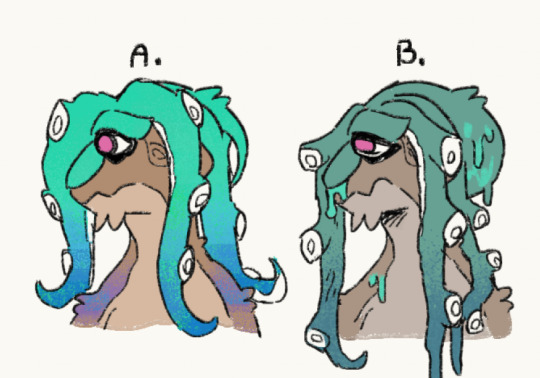
[The same inkfish when healthy (A) and when sick (B) exhibiting some common symptoms of illness. The most prominent symptom of any illness is desaturation of the skin.]
Regenerative Abilities
Cephalings are somewhat famous for their regenerative abilities and overall hardiness. Their bodies are incredibly flexible, and they have no bones - making them very impact-resistant. While they often sustain scratches and wounds thanks to their relatively thin skin, their regenerative abilities make up for many of their shortcomings.
In nature, neocephalopods would often lose limbs, from tips of the limbs to entire arms ripped off. This is a type of injury they are well adapted to, to the point that crown tentacles are even routinely cut off and minced for fashion purposes in the modern day. Wounds on the limbs bleed for a short time until the regenerative process begins; in inkfish, this window is even smaller due to ink bleeding out and helping to block the site of injury. Depending on whether the cephaling is healthy and gets proper sustenance, the limb often grows back in less than a year; in smaller species, it may grow back in even just a few months. Although cephalings can regrow their limbs as many times as they have to, it is quite common for mutations to occur, and the arm may split or grow in a strange shape.
Cephalings can regenerate a lot more than their arms - they can also regenerate parts of their organs, brains, and eyes to a lesser degree. Eyes can regenerate fully from shallow wounds, and partially from deeper wounds, to the point that an almost fully demolished eye can regenerate enough tissue to regain the ability to sense light. Minor brain- and heart injuries can also be regenerated, although with a higher margin of error with larger injuries that are still survivable. Damage to a branchial heart* is typically survivable, and the organs usually heal completely over time.
(* The branchial hearts are paired and are responsible for supplying blood to one gill each. Losing one entirely and surviving on just one gill is generally possible, although the reduced respiration poses some challenges.) Large injuries can still be lethal for cephalings. While losing one or more limbs isn’t particularly dangerous, situations where this happens as an effect of a predator attack often leave the cephaling unable to flee and thus cause them to get eaten. Injury to the systemic heart or the brain is also usually lethal within a short period of time. While they can regenerate limbs and organs, they are vulnerable to damage to the torso and mantle and are likely to perish from wounds that involve chunks being ripped off.
Common Ailments
Various ink infections. There are MANY kinds of infections that are caused when bacteria that really shouldn’t be in there get inside the ink sac. This typically causes atypical ink production and consistency, dizziness, possible body pains and ink droughts. Most ink infections are easily identified and are treated with antibiotics or gel that absorbs into the ink veins.
Ink bleed. A state in which ink bleeds out of the ink sac and the body involuntarily. It’s typically caused by the ink ducts being open involuntarily and abnormally, the body producing too much ink, the ink produced being too runny or a combination of several factors. It is usually a symptom of illness or abnormality of the ink sac.
Ink drought. The opposite of ink bleed. An ink drought is a condition where the ink sac produces much less ink than normal, or even none. It usually leads to issues with the muscles and upright posture due to low ink pressure, and usually leads to problems of the ink vein system and dry skin if left untreated.
Poisoning or Envenomation. The most common cases of poisoning are from contact with poisonous creatures, skin contact with chemicals, or from toxin accumulation in seafood. Symptoms of poisoning vary VERY widely based on the toxin, affected species and the amount of toxin absorbed, ranging from mild discomfort and lightheadedness to paralysis and rapid death.
Hypothermia. Low body temperatures are a very common problem within cephalings, especially during colder months. They can be caused by being in environments that are much too cold or consuming too much cold food or drink. Symptoms include drowsiness, shivering, weakness and lethargy. The treatment is simple and consists of warming up the patient, although this should be done gradually.
Malnutrition. Malnutrition is a bigger issue among cephalings than one would assume, and is often caused by either too little food altogether, or not enough meat being consumed. As a lot of modern street food is mostly carbohydrates and is vegetable-based, the overall consumption of meat can dip very low for some cephalings despite their carnivorous nature. Common symptoms include loss of muscle, tiredness and irritation, lightheadedness, consistent hunger, decreased ink production and stunted growth (typically in juveniles).
Muscle weakness. Issues stemming from muscle weakness are very common in cephalings, especially inkfish, which derive a lot of their stability from ink flow. Since cephalings lack real bones, any excessive weakening of the muscles can result in rapid loss of walking and standing ability. Significant loss of muscle function may result from general long-term inactivity, illness, malnutrition, low ink pressure or low ink levels and is quite common. Even slightly extended periods of inactivity or illness sometimes require people to depend on external mobility aids afterwards, and canes especially are a widely used option for countering muscle weakness both short- and long term. Some inkfish counter significant muscle weakness by abandoning bipedalism altogether and turning to spending most of their time in swim form. Some forms of muscle weakness prevent switching between forms altogether, though this occurs mainly in people who stop switching forms for an extended amount of time.
Ink pressure issues. An inkfish’s ink system pulses ink around at a somewhat consistent rate, keeping up the natural flow. An absence or overabundance of ink, ink infections, illness, stress and anxiety as well as a myriad of other things may cause ink pressure to be higher or lower than normal. High ink pressure typically causes restlessness, stiffness and ink bleed, whereas low ink pressure causes wobbliness and unstable movement, lethargy, muscle pain and reduced stamina.
Beak issues. Cephaling beaks grow slowly but indefinitely and need to routinely be filed down if not naturally worn down. If the beak isn't used enough to naturally even out from use, one may run into beak overgrowth. For most people, mild beak overgrowth isn't an issue, and parts of the beak sticking out of the mouth is generally considered inconsequential. More advanced beak overgrowth can become problematic by digging into parts of the buccal mass and causing infections and making eating difficult. This typically occurs with individuals who have fear regarding beak procedures or healthcare. Other common issues with the beak include beak misalignment and brittleness of the beak.
Radular decay. Radular decay occurs when bits of food are stuck between or under the radular teeth, causing infection, and is more common with plant-based food sources. It is prevented by regular cleaning or brushing of the radula. Mild forms may be limited to radular pain and occasional bleeding, but severe radular decay may require the radula to be removed, which significantly limits a cephaling's diet. For perhaps obvious reasons, radular decay is not of significance for species that have no radula.
Sucker infections. Infections of the suction cups are most prevalent in squid, which have chitinous sucker rings which can trap muck, grime and other particles between the ring and fleshy tissue. Alternatively, hooks or rings can grow incorrectly or overgrow if not maintained and dig into the flesh, causing infection. They occur more commonly in people who regularly use their suckers and get them in contact with different things, but often fly under the radar for people who use their suckers for touch-based things less and thus assume that sucker care is irrelevant. Infections of the sucker usually cause pain, bleeding, dryness and potential shriveling up of the infected suckers, where severe infections can cause individual sucker necrosis and spread to the whole limb. Crown tentacle infections are particularly dangerous in that the infection can easily spread to the brain. In situations where a sucker is badly infected, it is typically precautionary to remove the sucker, a part of the limb or the whole limb, as it is often safer and more convenient to replace an inflamed sucker than it is to wait for infection to subside.
Conditions and Mutations
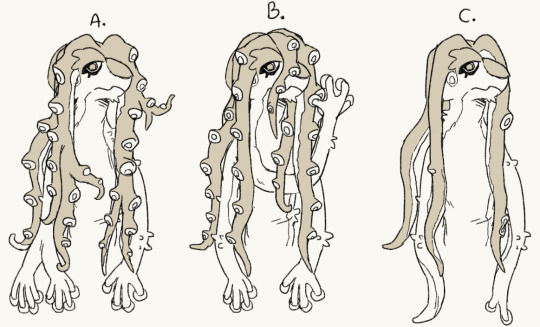
[Three common limb mutations, the most common types of significant mutation among cephalings. Limb mutations can occur as part of a genetic condition or by chance during regeneration of a limb. With the modern prevalence of tentacle cutting, it is said that up to 40% of limb regenerations involve some form of mutation. Pictured are A. branching, B. anemonism and C. blanking.]
White Beak. The color of the inkfish beak especially varies greatly in its ratio of black and white. While the base of the beak is always pale, ancestral squid and octopus beaks were mostly dark in the exposed area. In modern inkfish, a common mutation makes the beaks almost entirely pale, which also has the effect of them being softer in comparison. In the current day, predominantly white beaks are more common than black beaks are, although the majority of people will have some form of gradient in beak color and hardness. In a big part of the population, this comes with a larger risk factor for beak chipping and limitations for food hardness, though it also reduces the risk of beak overgrowth in comparison to black beaks. Brittle beaks are usually treated primarily with a threshold for maximum food hardness and beak polish to protect the surface of the beak, whereas beak chipping is usually handled by attaching artificial parts to the beak to shield it during regrowth or filing the rest of the beak to be level with the chipped segment. Cracks in a beak can be filled in with a hardening filler substance that conceals the crack and strengthens the beak.
Color Lock. Some cephalings are born without some of their ink sac chemicals, which limits the colors of ink they can mix - some extreme cases are limited to just one color. Aside from the inconvenience of having limited ink colors, the mutation is harmless. In some cases, people may choose to treat color lock by ingesting dyes to color their ink to whatever the situation calls for. Sometimes, color lock can be caused temporarily by a disease or underlying health condition, but permanent color lock is only genetic.
Ink Wither. A condition in which the ink sac produces very little ink, and may stop producing ink completely. It causes permanent ink drought, though ink drought on its own is usually a temporary symptom caused by a myriad of things. Although ink wither usually exists from birth due to unusual development of the ink sac or other related complications, it is sometimes caused when an ink drought caused by other triggers, such as disease, dehydration, bacterial infections or malnutrition, is prolonged and becomes chronic. It is treated mostly through artificial ink refills, ink soak therapy* and external mobility aids due to low ink levels often causing complications with stability.
(*Ink soak therapy is a treatment in which an inkfish bathes in a shallow tub or dish of ink. Prolonged contact with large amounts of ink has been proven to stimulate the body's own ink production, so it is an effective remedy for some instances of ink drought and also helps absorb ink into the system.)
Ink Boom. An opposing condition to ink wither in which the ink sac produces excessive amounts of ink and continues to do so even when full. It usually co-occurs with chronic ink bleed. The severity of the condition determines difficulty of the treatment; in cases of slightly above-average ink production, attention to hydration and sufficient purging of ink throughout the day may be enough to manage the condition, whereas high-producing cases may require constant monitoring and frequent hospital stays. In most affected people, the severity of the condition varies on environmental or other factors and may come in episodes. Ink boom is a condition often developed by long-term ink battlers due to frequent usage of large amounts of ink, but may develop throughout childhood or in adulthood, where it most often develops from substance use or stress. Typical symptoms include comorbid chronic ink bleed, stiffness, swelling under the skin, dehydration, malnutrition and restlessness. Treatments include purging of excess ink to avoid buildup, monitoring hydration and nutrition levels, medications to relax the ink sac or, in extreme cases, removal of the ink sac, which imposes dependence on externally sourced ink but eliminates the root cause. Ink boom sometimes occurs temporarily as a comorbidity to various health complications, and is sometimes a precursor for progressing into ink wither later in life.
Branching. Branching is a state where the limbs split and branch at the ends to form new ones continuously. Branching can be developed at birth, upon which it is typically permanent. A person with branching will typically have their limbs split into two or more growths upon the tip being cut off, or a new branch may start growing out of a non-injured limb arbitrarily. It can affect all the limbs or just some of the limbs, but an inkfish with genetic branching will always develop branches on a limb, even if cut off and regrown, although the size and position of the branching may change and vary. In individuals where only some limbs are affected, cutting off an unaffected limb will typically spread branching to that limb upon regrowth. Consequently, there are many people that are unaware of having the condition due to having no external traits until a limb is first regenerated. Some people may develop temporary branching as a result of stress, or randomly while regenerating a limb. Branches can be removed by cutting off branches and burning the root tissue to prevent regeneration, although this is done primarily for cosmetic reasons due to branching of the limbs being generally inconsequential health-wise.
Anemonism. A common genetic mutation that causes more than the usual amount of limbs to form. In most cases, it manifests in the form of additional crown tentacles, but there are sometimes extra arms or legs. The rarity goes up with the amount of extra limbs present; it is quite common for inkfish to have one or two extra crown tentacles, for example. It differs from branching in that the new limbs originate straight from the body with complete or partially complete muscle groups, rather than branching off from an existing limb. New limbs do not grow in later in life, although the onset depends on the type of anemonism; additional locomotive limbs are present from birth, whereas additional crown tentacles will grow in with the rest of the tentacle crown. Conditions where one or more of the limbs or crown tentacles are absent are considered a subset of anemonism, usually referred to as reverse anemonism.
Blanking. A somewhat rare condition which causes less or no suction cups to form, resulting in greatly reduced amounts of suckers and a signature “blank tentacles” look. It is usually present from birth, although similar effects may occur in regenerated limbs for people without the condition. It affects both the crown tentacles and the graspers; some people may only have a few suckers, some people may have none at all, and it may affect different limbs disproportionately or only affect some of the limbs. It is most noticeable in octolings, although it occurs in all sucker-bearing cephalings. In decapods, it often causes the tentacular clubs to form in unusual shapes or not form at all, and commonly results in oddly shaped or missing sucker rings. People with the condition often have comorbidities affecting the suckers, such as splitting, asymmetry, stunted development of the sucker or dulled chemoreception. For people with blanking, cutting off and regenerating limbs still produces reduced suction cup numbers, and developing other regenerative limb abnormalities is quite common. It is a condition that doesn’t require medical treatment, although people for whom it affects the graspers may benefit from specialized equipment for fingerless species.
General Limb Abnormalities. Extra limbs, missing limbs, extra suckers or missing suckers, limbs with no hand or multiple hands per limb - the list goes on. There is a plethora of limb abnormalities within neocephalopods, and they are not actually that uncommon; roughly one in 5 inkfish has something of the sort at some point of their life. Oftentimes, extra limbs, suckers or arms are at least partially or even fully functional. Many limb abnormalities are permanent and present from birth, while the most common ones can develop at any time, usually resulting from damage to a limb. People with one type of genetic limb abnormality are also likely to have other coexisting conditions; for example, anemonism and blanking often co-occur.
Kraken Syndrome. Kraken Syndrome is a psychological condition where the Kraken response* triggers dangerously easily. This condition occurs when the body is conditioned to frequent Kraken transformations to the point where the brain becomes exponentially more receptive to triggers for Krakening and thus dramatically lowers the threshold for natural Kraken episodes to occur. When this threshold is low enough, the Kraken is triggered abnormally easily and Kraken Syndrome is diagnosed. It is treated mainly with exposure therapy, mood stabilizing medication, depressants and sedatives, and specific medications that induce fatigue or physically weaken the body enough to prevent physical Krakening. It is highly comorbid with anxiety disorders, which also often function as triggers. Kraken Syndrome became widely documented in the late 2010’s, almost uniquely among frequent users of the Kraken special weapon. It is not to be confused with the rare condition where the Kraken form is able to be triggered at will with no psychological effects; this is not a type of Kraken Syndrome as it involves a voluntary transformation as opposed to a lowered threshold for involuntary uncontrolled transformations.
(* The Kraken response occurs with the fight-of-flight response of inkfish and correlates with a threshold of emotional distress that triggers the transformation. During a Kraken transformation, the inkfish becomes aggressive and disoriented, ink production is drastically increased, ink builds in the muscles and tissues increasing the individual's size, and a deimatic display is forced, often creating a high-contrast pattern. It isn't a panic reaction in itself and not all panic reactions inherently lead to a Kraken episode, but some degree of extremely high anxiety and desperation or anger are mandatory for a Kraken to trigger. The threshold that a Kraken triggers tends to vary based on person, but it generally requires an extremely high-stress situation with imminent threat. In general circumstances, the average inkfish will probably Kraken zero to three times in their life.)

[An image detailing the differences between typical emotional agitation required to trigger the Kraken response between unaffected individuals and those with Kraken syndrome. The special charge state is considered the basic state of agitation when special weapons become usable due to increased metabolic rates and high ink production. The Kraken response is typically far above the average person's typical agitation levels and triggers only in extremely dire situations. Usage of the Kraken drug for Turf Wars artificially lowers that threshold for the transformation itself to roughly the same threshold as the special charge state. Frequent transformations under the influence of the drug do not trigger the psychological disorientation and other effects of the Kraken, but they are still generally detected by the body and brain as an emergency situation, which lowers the natural threshold for natural Krakening over a long period of transformations to compensate for frequent threats. This causes an effect where even minor agitation may trigger the brain into a full-blown Kraken transformation in response to a nonexistent threat and is the case for people with Kraken syndrome. High-strung Kraken syndrome is diagnosed when the threshold for Krakening is so low that it co-occurs with the natural special charge state of the individual or even before that emotional threshold.]
Deep-Sea Gigantism. Shortened often to DSG, deep-sea gigantism is a sudden growth spurt caused by high long-term stress levels. It is a defensive response to unfamiliar or threatening life situations, mostly fueled by hormonal changes in the body in the long term. DSG gets its common name due to its prevalence in people moving in or out of the Deepsea, in which case it is often triggered by extreme change in pressure levels, disorientation through change in environment and general stress of moving, which captures a lot of common triggers for the condition. The name isn’t to say that the underground or -water are the only conditions where it occurs; it may occur as a response to any type of long-term stress, anxiety, frequent threatening situations or even some medications. The main symptom of deep-sea gigantism is unnatural, accelerated growth that might be dismissed in the short term and only becomes apparent within the span of months where it becomes clear that the pace is abnormal, and it is common to outgrow the typical size estimates for one’s species under long-term DSG. Other symptoms include increased hunger and appetite, fatigue, rapid muscle gain, headaches and general disorientation. The condition may be self-fueling due to the body directing most of the energy into growth and thus causing potential deficiencies elsewhere. Long-term instances of DSG with significant growth may also cause issues and comorbid conditions to develop due to the growth of the body and the growth of the organs and ink sac often being disproportionate. Deep-sea gigantism differs from regular gigantism in that it is a temporary (albeit often long-lasting) condition that has external triggers as opposed to a permanent condition. It is typically treated with anti-stress medication, eliminating underlying root causes, and limiting energy intake. Short periods of DSG often go entirely unnoticed, but longer periods are highly problematic due to the increase in body size not being reversible.
Hyperchromatophorism. Casually referred to as hi-chrom, it is a type of hyperpigmentation that causes chromatophore amounts in excess and causes the skin to be abnormally brightly colored in adult individuals where chromatophores are typically sparse. It is different from late onset of mature chromatophore sparsening due to the density of chromatophores being drastically higher to begin with. Usually, hyperchromatophorism is present from birth and affects either the whole body or large areas of the body, causing vivid colors and patterns to display across the whole body or areas of the body rather than just the crown tentacles. The intensity of these colors depends on the individual, and the condition may be light and only cause slightly increased saturation in parts of the body, or it can cause the entire body to be a solid color. It is mirrored by hypochromatophorism, which is a partial or complete lack of chromatophores in an area, and is about as common as the former but less noticeable due to mainly being visible in the crown tentacles. Either condition can occur in people without the conditions in areas where skin regenerates, and is quite common with large wounds.
Chronic Ink Bleed. Chronic ink bleed is a condition where excessive amounts of ink seep through the skin and the ink ducts are permanently, or predominantly, open. It is a consistently repeating or constant presence of the ink bleed condition which varies in severity based on whether the ink ducts are permanently open or only frequently open. Chronic ink bleed almost always co-occurs with chronic dehydration, low ink levels, malfunctions of the ink sac and ink system and mobility issues stemming from ink loss. It is usually managed with means that prevent or lessen ink evaporation; absorbent body wear, lotions that clog ink ducts around the skin or other medications that force the ink ducts to close, or alternatively frequent ink refills often administered by portable machines intravenously. Inkfish with chronic ink bleed often fare poorly in areas with dry air. Significant and long-lasting ink bleed is often a symptom of illness, and it may turn chronic after severe episodes of sickness. Chronic ink bleed can be a birth condition or it may develop later in life; late onset is often seen in professional Turf War players. It may also develop as a side effect of medication, unrelated illness, high stress or anxiety levels or hormonal imbalance, although in these cases it is typically reversible.
Color dysfunction. Color dysfunction is a condition where the color-changing skin cells aren’t under conscious control, and cycle colors randomly. It doesn’t apply to dead or inactive chromatophores as the affected cells are alive and active, but the ability to control them is absent, limited, or leads to inaccurate displays. Cephalings with the condition have highly variable skin patterns, from constantly cycling colors in no particular order, spontaneous deactivation or activation of the skin cells, or colors that somewhat correlate with emotion or activity but still have no conscious control. People with color dysfunction may have it across the entire skin, or it may be isolated to specific patches of the body while other areas have controllable pigment cells. It may also develop in areas where skin regenerates for people that do not have it as a pre-existing condition. It is most often present from birth, but sometimes develops later in life in response to stress, brain damage or psychological conditions, where it may be permanent or subside with time. Symptoms also often arise temporarily as a response to drugs, medications or high stress situations. Color dysfunction has a high occurrence rate alongside different psychological conditions and is presumed to be a mismatch of electrical signals in the brain to what is actually displayed on the skin, or overall dysfunction of the center that dictates color change.
Color stasis. Color stasis is a subtype of color dysfunction where the color-changing cells are alive but permanently deactivated involuntarily. It differs from chromatophore atrophy or chromatophore death in that cells are not dead, but deactivated. It is caused by inactivity of the brain center in charge of color change, whether that is due to an absence, partial inactivity or nerve damage to parts of the body or brain. It can be present from birth or develop later, typically due to brain damage or substance abuse. It may also extend to all skin or only be present in select areas or patches of skin. People without the pre-existing condition sometimes develop individual patches of color stasis in areas where skin regenerates.
213 notes
·
View notes
Text
Recognize the Magic of the best Air Cleaner Products
Breath Easy: Your Ultimate Guide to the Best HEPA Vacuum Cleaners for Pet Allergies, Allergy Control Products, and Dust Mites.
The best advice for choosing the perfect air cleaner for your living space.
Allergy control products are working hard to find effective products that can control allergies, and asthma along with supplying an allergen-free indoor atmosphere. Air cleaners and vacuum cleaners are the most useful products that I have come across.
Nowadays, air pollution is at its peak, and allergens like; dust mites, pollen, and dander, can destroy your health. It is necessary to invest in allergy control products that help you to breathe easily. Among the various options air cleaners play a vital role in creating a healthier environment for indoors. Let’s explore the benefits of an air cleaner and the best HEPA vacuum cleaner along with their impact on your life, in this blog.
Importance of Air Cleaners Air cleaners also known as air purifiers, are perfectly designed to improve air quality indoors by unfastening particles, pollutants, and allergens from the environment. I have mentioned some benefits of using air cleaners:
Protection Opposed to Airborne Diseases – Air purifiers can encapsulate then eliminate airborne viruses and bacteria. This offers an effective coating of protection throughout the COVID-19 pandemic.
Build-Up Respiratory Health – Air purifiers can reduce the risk of respiratory problems and are also helpful for asthma or other respiratory conditions.
Odor Eradication – Activated carbon filters available in various air cleaners help to remove odors from your home, leaving your room smelling fresh and clean.
Allergen Removal – Air cleaners can appreciably decrease allergy symptoms and provide an allergy-free environment. They are impressive at removing allergens like; pollen, pet dander, dust mites as well and mold spores from the atmosphere.
Choose the Right Air Cleaner HEPA filters enable to capture of small particles of 0.3 macrons with 99.97% efficiency, forming powerful technology for removing allergens like; dust mites, etc. The most ordinary type of air cleaner is the HEPA filter (highly efficient particulate air) purifier. Mentioning some important tips for choosing the right air cleaner:
Filter Type – HEPA filters can capture small particles like; dust, pollen, and various allergens, controlling them to float in the air and making the environment allergen-free. Do you have any allergy concerns? If so, then always try to choose air cleaners with HEPA filters.
Noise Level – After selecting the model, you should always check the ratings of the users. Some air cleaners are a little noisy. Proficiently, choose one without compromising noise, especially for your bedrooms.
Room Size – Select a model that best suits your room’s size. Choose a model with your room preferences.
Best HEPA Vacuum Cleaners for Dust Mites Listing some of the best HEPA vacuum cleaners for dust mites:

Shark Navigator Lift-Away Professional – This HEPA vacuum cleaner is the best choice under budget that can fulfill all your needs. It features allergen-free completely enclosed technology and a HEPA filter.
Dyson V11 Animal – This vacuum cleaner is renowned for its strong suction facility along with a HEPA filter.
Miele Complete C3 Cat & Dog – Miele vacuums are famous for their durability and performance. This model also comes with a HEPA filter along with a special attachment for removing allergens.
Conclusion Air cleaners as well as vacuum cleaners both are indispensable tools. When selecting an air cleaner or vacuum cleaner for your living space, first you should think about your requirements. Then as per your preferences choose a perfect one.
0 notes
Text
basic ass witch tips 🔮
[revised post from ~2018 & last edited on 9.29.24]
please note that these are all related to things i have actually seen discussed or mentioned. please do your research before blindly following the advice of someone online, myself included.
if you're on some kind of medication, including but not limited to hormonal birth control, heart medication, and anti-depressants, double check with your healthcare professional/provider [HCP] before you drink that new tea you just bought.
always, always, always tell your HCP before trying any kind of herbal supplement, whether it’s something you made yourself or something you bought at the store.
have a diagnosed medical condition? talk to your HCP before ingesting anything or putting anything on your body that you aren’t familiar with.
don’t. drink. essential. oils. essential oils are not consumable!!!!!
citrus oils can cause photosensitivity, or being sensitive to light and more susceptible to sunburns so be mindful when using these oils on your skin.
if it hasn't been emphasized enough, PLEASE dilute your essential oils before use! common carrier oils are grapeseed, castor, olive, coconut, avocado, almond, etc.
oil and water don't mix, so you would need to use an alcohol based solution with essential oils to dilute them that way (if you plan to use them for a spray or something of that nature).
be mindful of using sprays, incense, powders, etc. that could release particulates into the air around pets or those who have allergies, respiratory issues, etc.
don't involve your pets in your practice in a way that could be harmful to them - no essential oils on them, no crystals in their water bowl, no moon water that's been sitting on your shelf for weeks.
i beg you, please don't put crystals in any uh bodily orifices.
there are some herbs you absolutely cannot burn (or use safely, really) for any reason, so make sure you're educated on all that beforehand; yew, for example, is highly toxic and potentially fatal if consumed or inhaled. the leaves, bark, and seeds contains a chemical called taxine, which is what some of the most hardcore chemotherapies are made from so keep that in the back of your mind.
that being said, please wear gloves and use common sense if you decide to forage for your own herbs or plants. i know that plant identifying apps exist so if you have a smartphone, that might be a good place to start.
putting salt on grass does a couple of things: salt removes moisture from the soil, thus drying out the grass and killing it; and, salt causes chloride to build up in the soil, thus making it toxic which inhibits chlorophyll production, leading the grass to eventually "starve" and die - please don't do this.
don't leave candles unattended - even small ones; it's not a good habit to get into.
also!! crystal balls in direct sunlight can cause a fire so be careful!
more fire stuff - be mindful of the environment and also safety so check for burn bans before you make a fire outdoors.
sterile lancets, not needles or pins. that's all i'm gonna say about that.
don't drink water you collected from anywhere outside unless you plan to properly filter it first.
if you plan to store water for later use (moon water, for example), refrigerate it or set it in a cool, dark place.
distilled water is free of minerals and contaminants so it has a longer shelf life than tap or bottled water - keep this in mind when making charged waters or other potion type things.
fresh herbs or other things of that nature left at room temperature can also grow super harmful bacteria. for example, putting raw garlic in olive oil and leaving it at room temperature will end as a breeding ground for botulism and mold.
be safe out there!
© 2024 𝚊𝚍-𝚌𝚊𝚎𝚕𝚎𝚜𝚝𝚒𝚊
251 notes
·
View notes
Text
Sneezing dynamics I like 2
Small touches of comfort, almost without noticing, more out of habit than anything else. Lightly rubbing the back, a small touch on the forearm or leg, gently stroking the hair.
Extremely polite sneezers. Sneezing into the elbow, wrist, or forearm, or even into the inside of a jacket. Moving away from the person they’re talking to or interacting with in order to sneeze.
Sneeze forceful, congested exhalation. Pressing the bridge of the nose and shaking the head. Blinking several times and trying to focus on the pile of work ahead.
A congested person who doesn’t blow their nose productively because they don’t want to make too much noise and disturb the environment, instead passing a tissue over their nose just to remove the moisture, causing them to constantly sniffle.
*Stifled sneeze* "Bless you. You’re going to hurt yourself, why sneeze like that? / It hurts just to hear you." "That’s how I sneeze, I don’t know any other way." "You sneeze in a very unproductive way." (Casual conversations about sneezing)
Pre-sneezing face on someone who rarely loses control; their usually composed and controlled demeanor fades in a brief moment of vulnerability: their mouth opens slightly, eyes squinting in anticipation, and their expression becomes soft and unguarded, revealing an uncharacteristically delicate side just before the sneeze.
“Excuse me” after sneezing 😳 and if it’s like an exhale or very congested, or still pressing/with the hand on the nose *-*
“Can you pass me a tissue, please…?” In a soft voice, because they’re too focused on not sneezing yet. When the other person hands it over, they quickly bury their face in the tissue and release a stifled or muffled sneeze.
Two people sitting on the bed, chatting, facing each other. One of them sneezes three/four times mid-conversation, suddenly, although they usually sneeze once, maybe twice. "Uh, are you getting sick?" "I don’t know, my nose itches"
Hoarse voice when getting sick. The other people notice they’re sneezing more than usual, scrunching their nose every so often, or getting lost in the conversation/being less attentive than usual. The people around, however, don’t say anything because they know they doesn’t like to show vulnerability, but they make small gestures. They offer hot coffee, press their shoulder when they sneeze, hand them a tissue in silence.
Shivering after sneeze.
Two people sharing a hotel room (in two separate beds or the same). There’s not much trust between them, they’re just sharing space due to circumstances. From the perspective of one of them, X hears, but doesn’t see, that Y is shifting uncomfortably in bed and rubbing their nose. Y starts having a sneezing fit, trying to contain it as much as possible so as not to wake them. X pretends to be asleep but eventually decides to get up and bring them a roll of paper. Neither says anything other than a whispered thank you.
TIRED sneezes. A lingering cold, and sneezes that practically drain all the energy you have, barely coming out through an already scratchy throat and a sore chest.
Offering to turn on the heating when someone is having a sneezing fit, or rubbing their arms to warm them up.
A hand with long, thin fingers, full of rings, holding in a sneeze. No more. 😳
Someone else keeping count of how many sneezes the other have had when the fit goes on.
The head shaking from a forced sneeze, especially when it’s stifled.
Someone who usually stifles their sneezes deliberately to try to stop a sneezing fit. "Finally. A somewhat satisfying sneeze." "Shut up."
Small or gentle sneezes (ApTsch'u! PTschu!) in someone who appears tough, proud, or cocky.
Different ways of blessing. "Bless you" "Bless" "Blessings" "Bless dear" "Gesundheit" Or even saying it in another language if the person speaks a different one: "À tes souhaits" "Salud!"
Okay, let’s talk about allergies. Rapid blinking, throat clearing, twitching the nose and gently passing fingers or knuckles over the nose to avoid itching. Slight sniffles. The nose is slightly redder than usual. Tired sighs.
Someone at a public event, holding a relevant position (perhaps the head of a company, a mafia leader, something like that) and their subordinate are talking to another important person. The high-ranking individual feels the urge to sneeze, and after suppressing it throughout the conversation, they can no longer hold it back. They place a hand on their subordinate’s shoulder and subtly hide behind his/her shoulder to sneeze into their hand. Then composing themselves and apologizing to their interlocutor.
Someone sneezes and forgets what they were saying. The other person notices how lost they are, the rising fever, and their flushed cheeks and nose. Before saying "bless you," they place a hand on their forehead. The other person closes their eyes. What level of intimacy is needed to place a hand on someone’s forehead without them asking for it?
Sneezing when injured. Perhaps a gunshot wound or after surgery, and the wound hurts when they sneeze.
[Thanks for the support on my previous post! <3 Would you like to read fics too?? :) ]
#Icouldbelikethisallday#butIthinkit'senough#funnierthanIexpected#snz blog#snz kink#snzblr#snz#snz fet#snzarios
223 notes
·
View notes
Note
I know you're not meant to clean inside the vagina, but what about the vulva? I'm always wondering if I'm supposed to be doing something specific for hygiene or if rinsing with a shower head is enough? Sometimes I'll use a no scent/dye gentle face wash and that doesn't seem to cause irritation, but I also get scared to do so too often because I'm not sure if I'm supposed to use any product. I also sometimes use a vulva wipe specifically before sex but mostly just because I'm scared of if I missed a teeny tiny piece of toilet paper or something, but don't use these regularly because it's really hard to find ones that don't have a fragrance and that makes me nervous! I know that there being a natural body odor is fine, I'm not self conscious about that, this generally from a perspective of wanting to be clean and healthy.
Unlike your vagina, your vulva isn't self-cleaning! But it actually sounds like you're following what you should do to a T.
You want to make sure there's no gunk or grime around your clitoris or around your vulva and to rinse it off. While a lot of people don't need to use soap, you definitely can as long as it's fragrance free, mild, and doesn't cause irritation [some people have allergies to certain soaps, so if it's mild, fragrance free and still causes irritation, you might just be allergic!].
A lot of people prefer to use soap and it's perfectly fine as long as you're using the right type and it doesn't bother you.
A lot of vulva wipes aren't good for you, specifically because of the fragrances actually! You've got good instincts, there. A lot of them are made as a "special menstrual/sex hygiene ^_^" product, almost all of which are a complete scam.
[Recently learned from another person on here about Lysol, the company that loves to make bleach products, leading the charge on douching as a menstrual/pre-sex hygiene product, as well as birth control! This trend is not recent.]
Fragrances are very bad for your vulva but if it doesn't have a fragrance, there's a possibility it's a good brand. I can't guarantee that though.
Hope this helps! I have some other related info in my #hygiene tag if you're interested, btw. Lemme know if you have any other questions! <3
102 notes
·
View notes
Text
A reluctant princess is visiting a nearby farming village in order to, in her parents’ words, “show the humility of the crown”.
However, her nose is unaccustomed to the dust, soil, and pollen of the countryside. Her pride keeps her allergies under control, if only barely.
After some general messages of goodwill and gratitude, she is greeted by a peasant, who has a caring heart but isn’t exactly the smartest. After a gift of wildflowers, and a close call from the princess’s nose, the peasant assumes that it’s some sort of custom, or a product of embarrassment, that the princess can’t sneeze unless someone else sneezes first.
However, in inducing themselves into sneezing, they are making the princess more and more desperate — and she won’t be able to keep back her sneezes for much longer.
#ohnos ideas#ohnos prompts#snzarios#snzario#snz#snzblr#snz kink#snz things#snezblr#snz scenario#snez kink#snezario#whump
64 notes
·
View notes
Note
I need suguru to cuddle me with my head against his chest cuz my period cramps are really bad and I feel like I'm dying (╥﹏╥)
I know he would take such good care of me and run his big hands over my lower stomach and coo at me that I'm so strong
- shy anon
Shynon T^T shynon if I could PERSONALLY hold you in my arms rn there would be no escape for you, cramps can be THHHEEEEE biggest bitch trust me ik exactly how that feels, btw dwww suguru is here to cuddle the pain away!!!!
He's holding you while you lounge on top of him like a cat and resting his hand over your uterus and stroking it so so very gently, serving as a heating pad :< Kissing you all over and swaddling you in blankets, manhandling you into whatever position will keep the pain under control, giving you the most toe-curling, eye-rolling back massage you never thought you needed, giving you his hand to squeeze as hard as you like, he knows its nothing compared to what you're feeling but he still wants so so so desperately to carry this burden for you HIS BABY DOESN'T DESERVE THIS!!!!!!!!, he understands, the digestive problem you could get as well but still very firm about you having to eat, holds you gently and coos at you to "please be good and take just this one little bite"
Is it really Suguru Geto if he's not monitoring the amount of painkillers you take?? (Honestly, the second you move in together he's in charge of the medicine cabinet but that's a conversation for another day) the answer is a big fat NO bcuz he's gently taking the bottle from your hand once you've taken too much and shushing you when you whine into his chest and he meets you halfway with a pouty little "I know, I know baby, I wish I could take the pain away" AND HE DOES!!!! He does and he hates that he can't do anything about it :<
Will gently massage your sore breasts for you until you fall asleep, and the snack pantry that's already on the verge of busting open is filled with even more chocolate, he's not the type to buy the entire pad/tampon section bcuz he knows EXACTLY what you use, and he will be judging your choice anon 💀 if what you're using isn't up to his ridiculously high standards he's taking matters into his own hands and getting you the ultra soft ultra cozy ultra anti-inflammation ultra anti-allergy sanitary products with 2029 suction technology whatever the fuck, you're getting the best the market could offer is what I'm trying to say anon 🙂↕️ tell him he's doing too much and he's pulling your cheek with a fond smile and thinking "my silly little baby <333" HE LOVES YOU!!! HE LOVES YOU YOU ARE HIS TO CARE FOR!!! HIS TO SPOIL!!!!!! :(((((
#shynon my precious baby you do NOT deserve this cruel fate come to my arms now 😭😭#let ME shoulder the pain :<#but fr tho!!! really really really hope the cramps give you a break!!! plz stay warm and eat well!!!!#˗ˋˏ –. 𐙚 ̊shy.Anon.ᐟ.ᐟˎˊ-
21 notes
·
View notes
Note
Do you know how invert sugar works? I've heard a lot of conflicting things about it and it seems to be increasingly popular in packaged foods and restaurant food which is frustrating cause it seems to be an IBD trigger for me. I avoid artificial sweeteners cause they're triggers for me, but invert sugar is increasingly in things that say all natural or no artificial sweeteners, is it natural? what is it?
It is natural! Or, well, it uses natural ingredients. It's sucrose (a disaccharide, white sugar) split into glucose and fructose (monosaccharides) through a simple chemical process (boiling and optionally adding some acid).
Sucrose is the common kind of sugar that we use all the time; it is made up of two simpler sugars: fructose, which we often think of as "fruit sugar," and glucose, the most common carbohydrate in nature (it's the product of the Krebs cycle and it's the carbohydrate that your body turns into stored energy through glycolysis). Here's a diagram of a sucrose molecule:
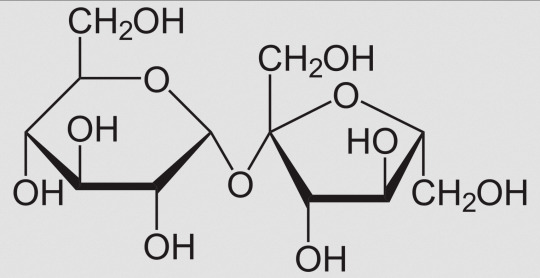
you can see that it already looks like two molecules, kind of, with just one oxygen atom in the center to hold it together. If you split this molecule with a chemical reaction, it will create distinct glucose and fructose molecules:
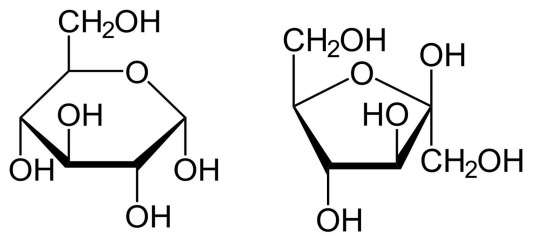
(Glucose is on the left, fructose on the right).
If you want to make your own invert sugar you can do so on your own stovetop right now. All you have to do is mix sugar, water, and lemon juice.
Have you ever made simple syrup for sweet tea? Or made hard candy? Simple syrup is 1:1 white sugar and water. Hard candy is 4:2:1 white sugar, water, and sugar syrup. Invert sugar is a syrup in between those two which is about 2:1 sugar to water with a very small amount of acid added.
There are several reasons that bakers and confectioners will do this, including:
moisture - invert sugar is a humectant
texture - the addition of invert sugar can help control crystallization of sugar in candy-making
sweetness - invert sugar is slightly sweeter than white sugar
appearance - invert sugar helps things to brown faster
So invert sugar can be totally natural, it's easy to make at home, and it has lots of uses in cooking that are difficult to achieve without introducing more ingredients or ingredients that might change the appearance or structure of the final product. However, if you have issues with processing fructose, invert sugar is likely going to be a problem for you.
Honestly this kind of question (which I had a lot more of after getting diagnosed with food allergies and celiac disease!) is part of why I started getting more into cooking and more into learning about food production and nutrition. When you have to learn about hidden sources of corn in the American food system you have to learn a LOT about food and you come around firmly to the idea that "natural" on food product labels is at best useless and at worst misleading.
When you (you specifically, anon) are looking at a food label you're likely looking to see if it's going to cause problems for you. You're not really looking to see if it's natural, but "natural" has become a kind of shorthand for "no high fructose corn syrup" - if what you're avoiding is fructose, natural is not the word to look out for.
240 notes
·
View notes